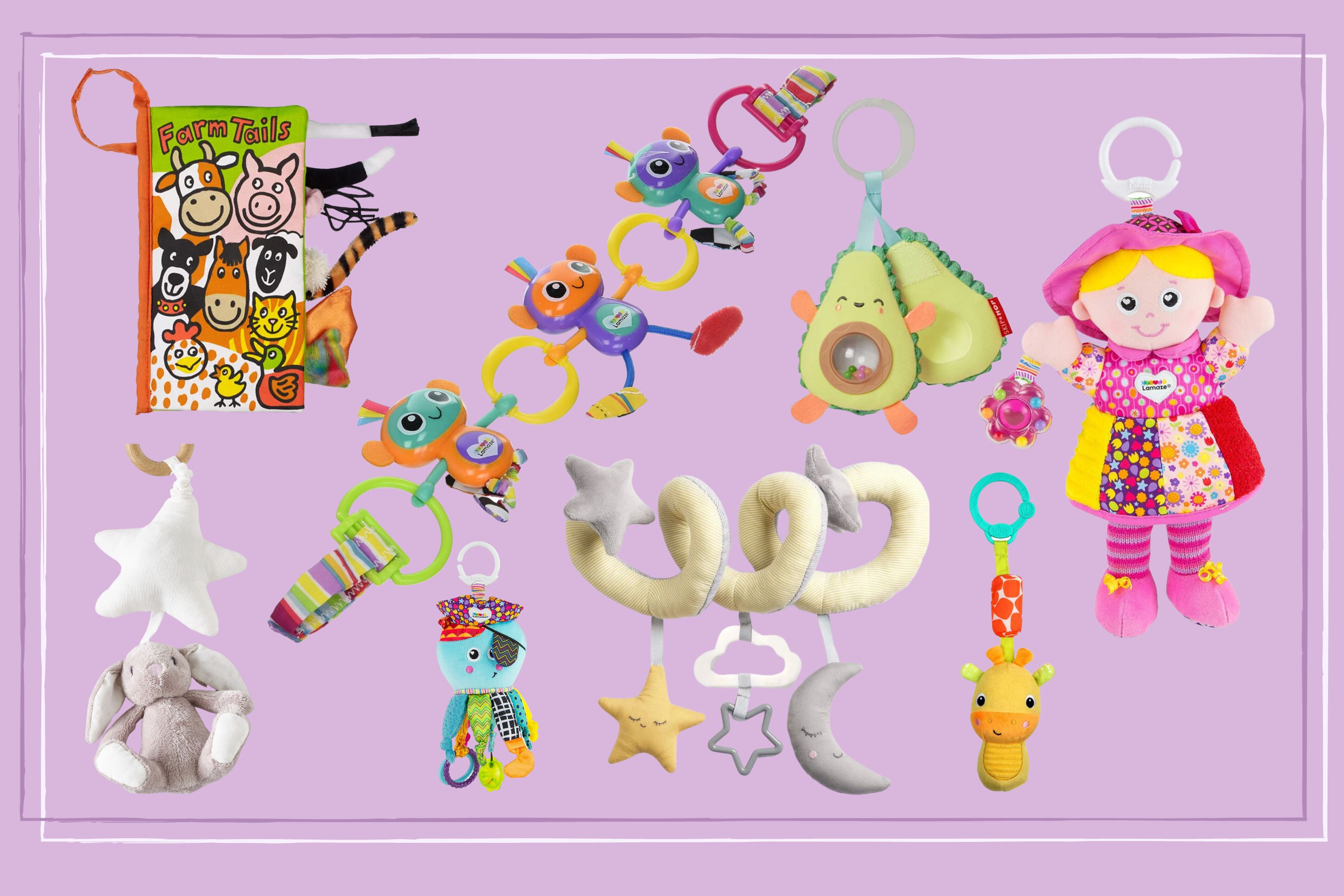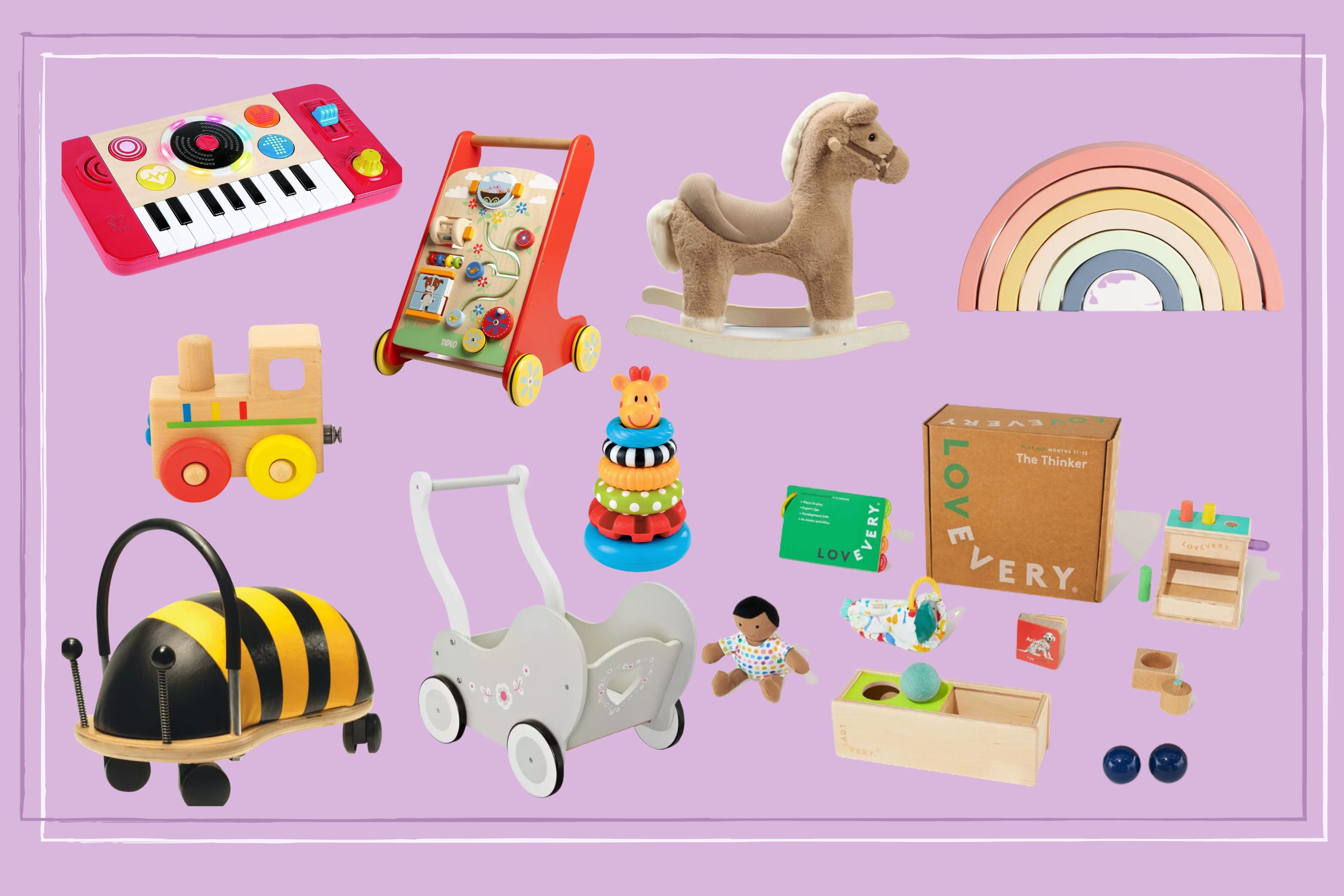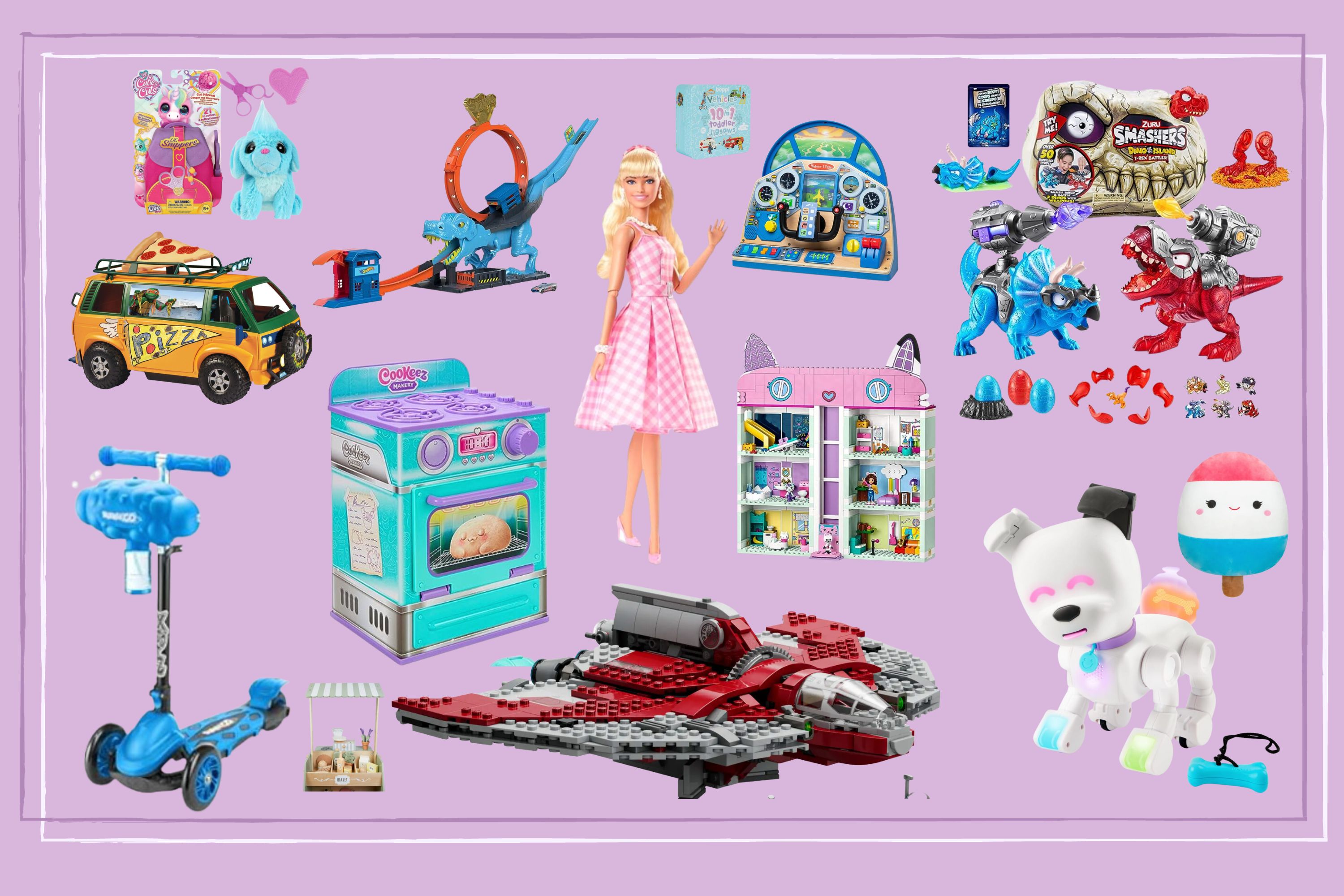Best toys for 6 to 12 months olds 2026: 42 top-rated buys, tried and tested
Discover the best toys for 6 to 12 month olds that will help your baby learn about the world around them
Heidi Scrimgeour
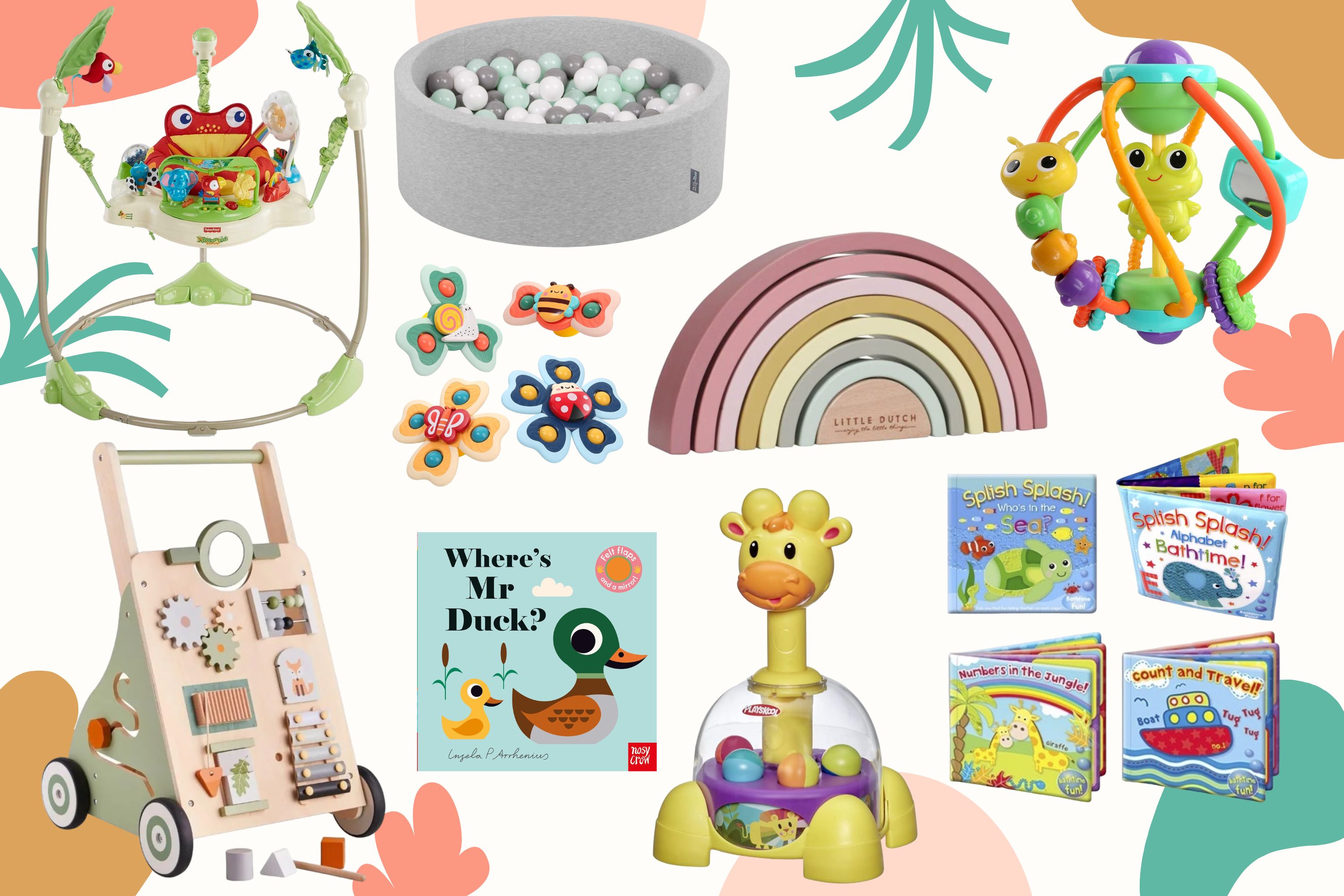
As you (and your baby) emerge out of the newborn phase, you might have your mind on one important question: what are the best toys for six to 12-month-olds?
While you might be used to playing with a newborn, the best toys for this age group are items that are perfectly sized for little hands to hold but big enough so that they won't get lost or eaten. This is also a prime age for your child to engage in sensory play so making sure you have a couple of the best sensory toys on hand is a great way to aid their development. You might already have some of the best toys for 1-year-olds, and there may be some cross over on this list, but a handful of these toys might not be age-appropriate for those younger than 12 months old.
Child development expert Dr Amanda Gummer says: "Babies love to play and this is a great way to support their development and learning." She adds: "Floor play aids core muscle development, kicking and swatting movements will strengthen their leg and arm muscles, and mirrors and moving objects and sounds, will all encourage a baby to lift their head and will, in turn, strengthen the neck muscles."
As well as their motor skills, toys for this age group provide a great opportunity to explore and get their imaginations going. Dr Gummer explains: "Playing with your baby will encourage them to reach for objects and explore things with their hands and mouths. They will start to anticipate repeated sights, sounds, and actions and will roll around to explore."
So, to help you decipher what toys are the best toys for six-month-olds we've done all the hard work and researched the market-leading options in 2026, putting them to the test. Each item in our guide has been recommended by parents or those who have purchased them as gifts. If plastic toys aren't your thing, then you'll be pleased to know that there are lots of beautiful wooden toys available that are perfect for this age group. We've tried to include as many wooden toys as possible as we commit to promoting more sustainable options.
Best toys for 6-12 month olds
1. Stacking and Nesting Toys
Stacking and nesting toys are crucial for six to 12 month olds for developing their fine motor skills, spatial reasoning and cognitive development, as well as their hand-eye coordination. They help to encourage an understanding of size, shape and sequencing too.
By stacking, your child is learning how to understand objects in relation to each other too. According to a report called The Development of Object Construction from Infancy through Toddlerhood, the ability to successfully stack or nest is different to other actions, like banging, shaking, or mouthing, because it requires a more complex understanding of the relationship between two or more objects.
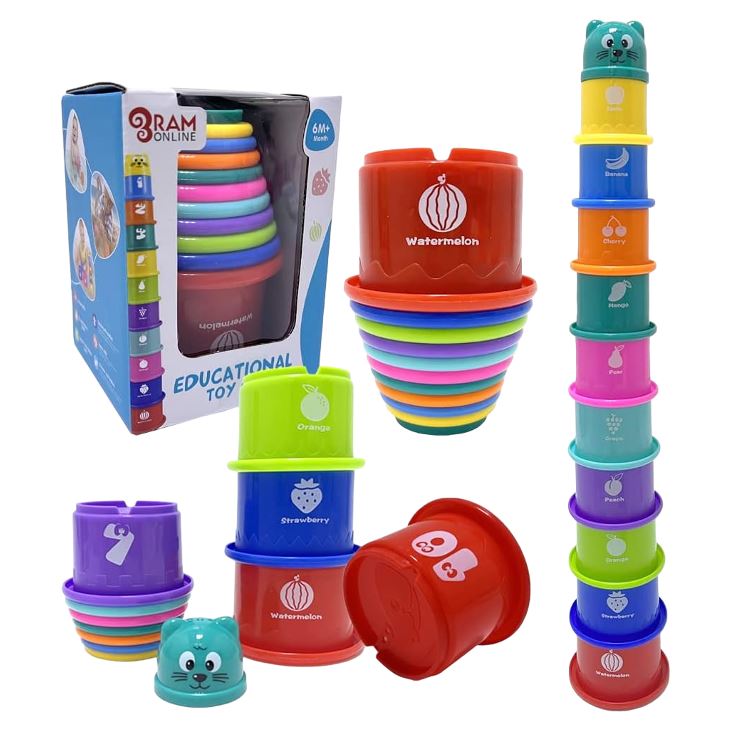
These bright and multi-coloured stackers are perfect to help your six month old start stacking. GoodtoKnow Editor Anna Bailey bought then for her daughter Freddie and says: “She loves these - building them up, knocking them down and hiding them inside each other, they keep her busy for ages. She also likes playing with them in the bath to collect water and tip it back out again.”
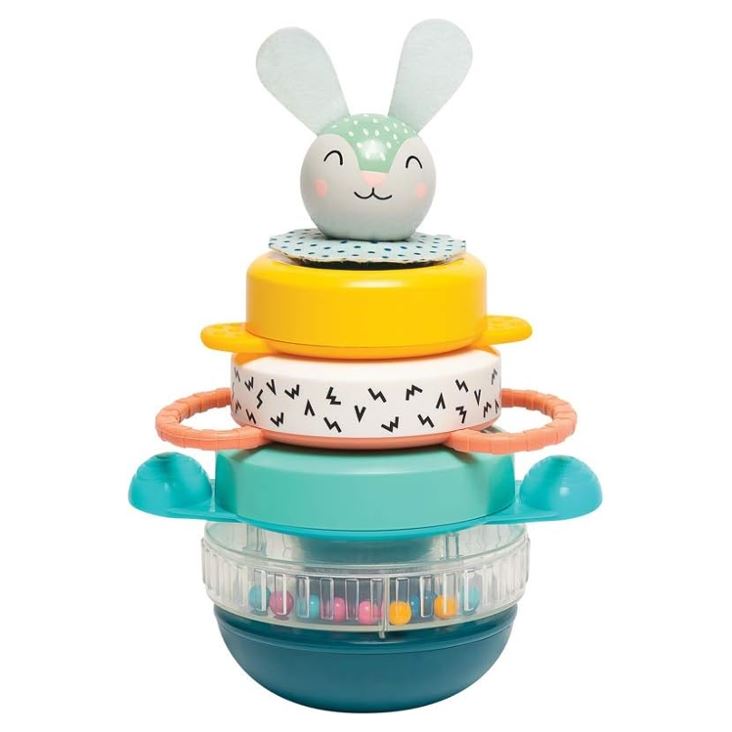
Suitable for infants aged nine months and over, this stacking toy features eye catching patterns, block colours and a friendly bunny character, which can help to develop your child's emotional intelligence. The rings are easy to grab and play with, perfect for a baby who is still developing their fine motor skills. The base ring also contains little balls that make a noise as your child plays.
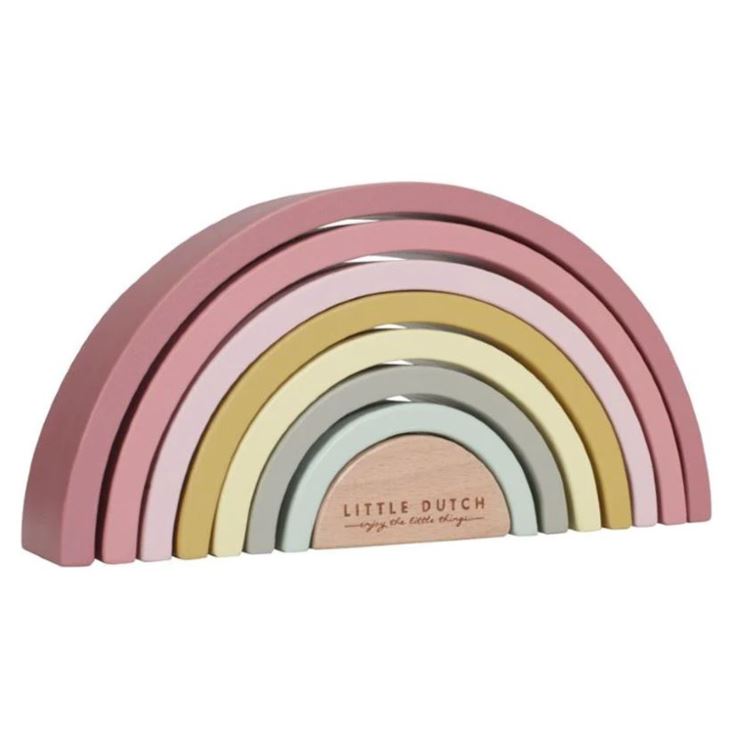
If you want something a more design-focused (and sustainable) before your little one starts to want garish plastic toys, then this wooden rainbow stacker is a great choice. Available in a range of slightly more muted colours, it features eight stackable arches for your little one to play with, and it looks beautiful as a decorative piece when not in use.
2. Textured Balls
Textured balls are perfect for stimulating your six month old's sensory development, enhancing their fine motor skills and encouraging movement and tracking skills. But it doesn't have to be balls - we've found these textured bean bags that offer a brilliant sensory experience for little ones to enjoy.
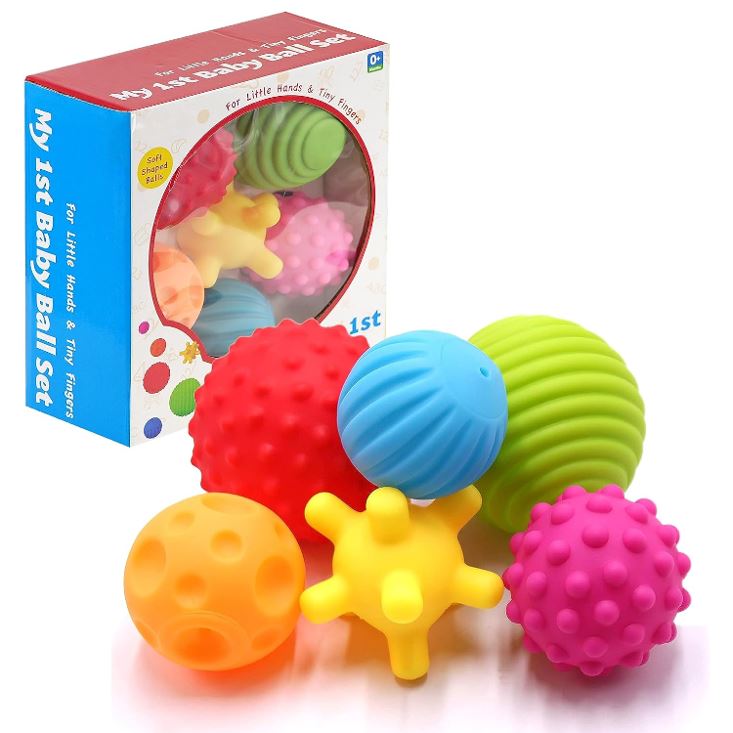
This six-piece set includes multiple brightly coloured balls with different textures for your little one to explore. Mum Anna told us: “These are so fun and colourful - Freddie loves crawling around trying to find these, and touching all the textures. The presentation is great as well, would make a lovely gift”
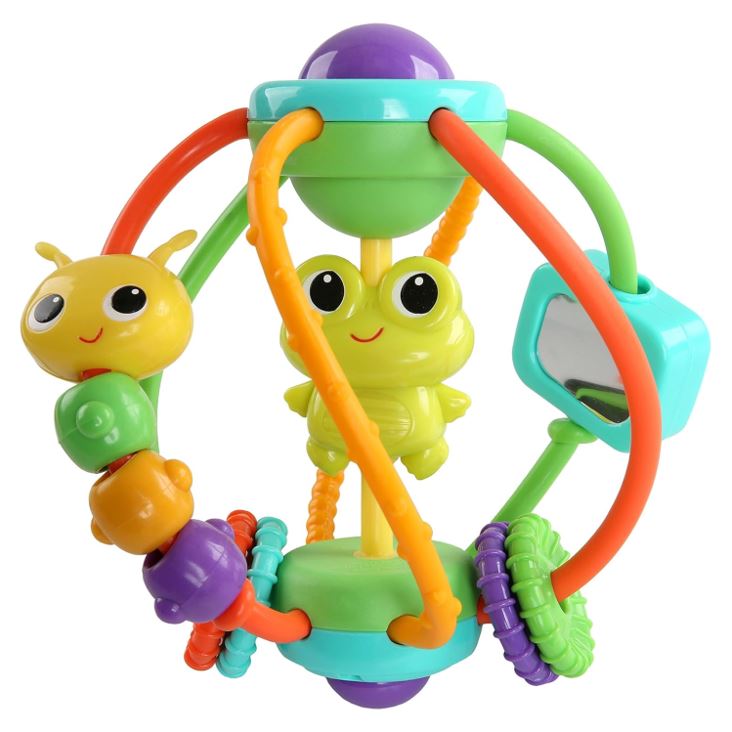
This activity ball offers loads for your six month old to engage with. The handles are easy for little fingers to grasp, and then they can shake, spin and slide the various tactile elements. It's also brightly coloured, with multiple friendly faces for your tiny human to interact with.
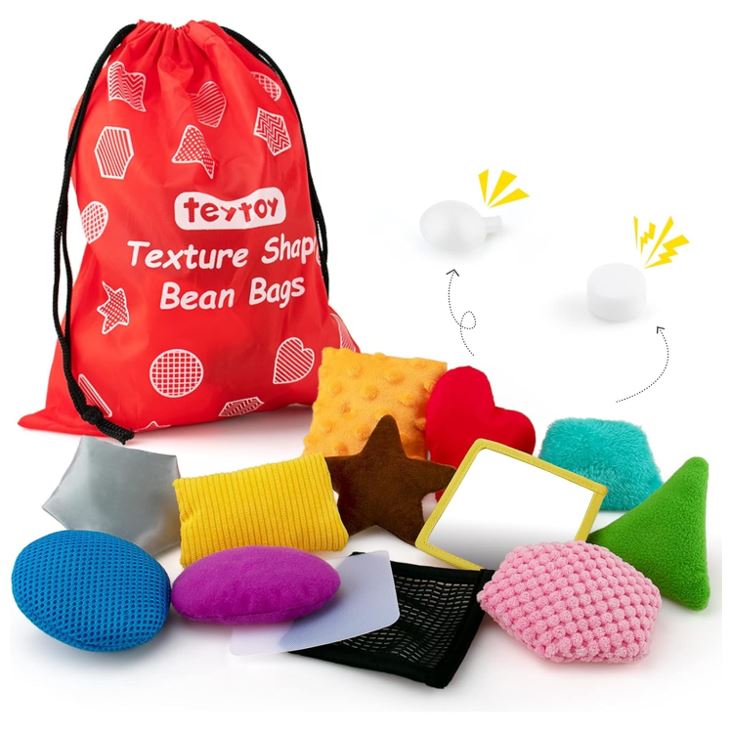
Also available in a ball toy set, these textured bean bags offer a tactile sensory experience for your child. With textures ranging from corduroy and wool, to nylon and mesh, and a variety of shapes including squares, stars and hearts, little fingers will love getting to grips with these bean bags.
3. Musical Instruments
As well as providing an introduction to music, musical toys can help to foster auditory development and rhythm, leading to improved cognitive skills. This makes them great toys for when your child turns six months old.
Research shows that babies respond well to the rhythm and tempo of music from an early age and find it more engaging that speech, while other studies show that early exposure to music encourages your child to smile more, improves their communication skills and boosts their emotional understanding.
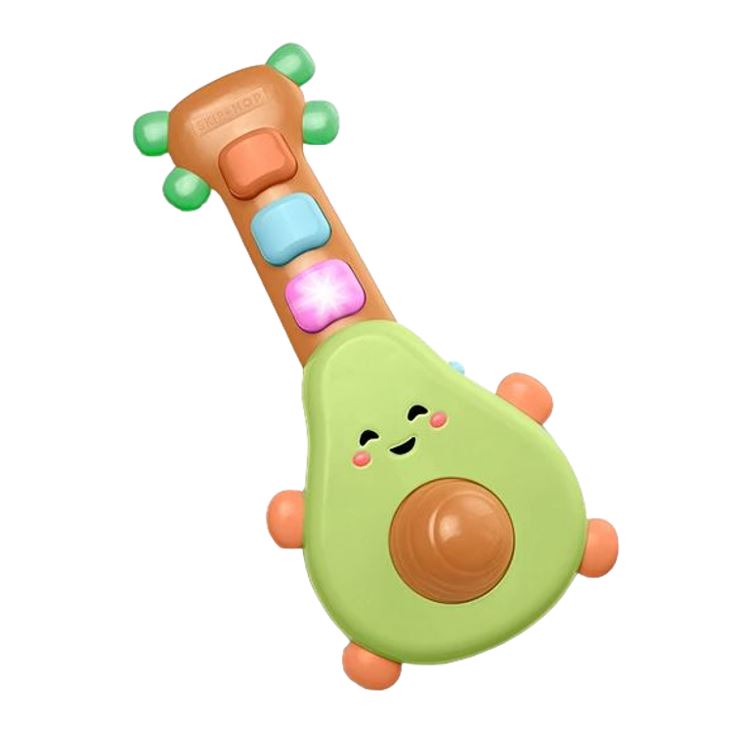
Easy for little hands to hold, this avocado shaped guitar toy features light up buttons and a spinning pit to get the music started. Suitable for infants from six months, little ones will adore the cute face and selection of tunes to bop along to. Watch their fine motor skills develop right before your eyes!
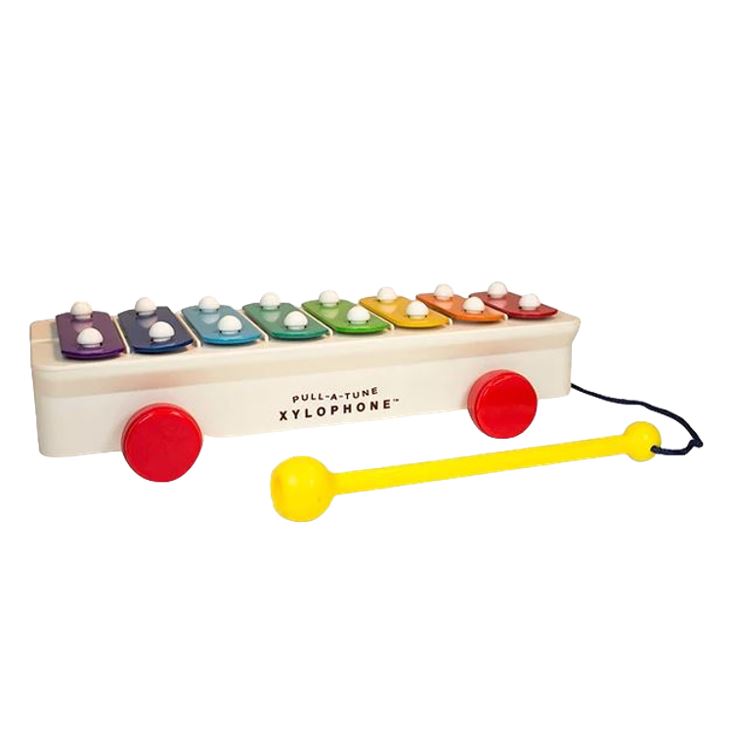
The classic Fisher Price toy is perfect for little ones first foray into music. They'll improve their fine motor skills by gripping the mallet, grow their hand-eye co-ordination by hitting the coloured bars, and this toy is on wheels so they can take it with them as they move around. For bonus points, the mallet is attached so it's play-ready at all times.
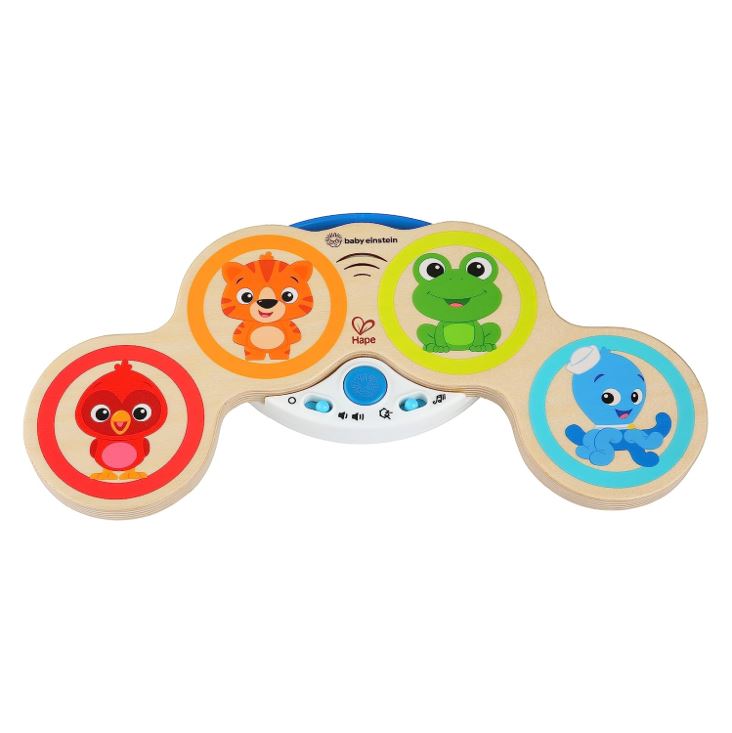
With cute animal characters to help develop your infant's emotional skills, this drum toy (suitable for children from six months) has a smooth wooden top, which when tapped, start the musical sounds. There are two modes, one where your little one can play classic tunes, and another where they can create their own rhythms.
4. Interactive Texture Books
Interactive books for babies not only provide a range of textures, flaps to lift and elements for little hands to explore, but they also have brightly coloured and engaging illustrations. This combination not only promotes sensory development but also helps your six month old improve their fine motor skills and gives them a boost when it comes to early literacy.
Interactive books like this encourage participation, whether that's influencing the storyline or making choices, all of which promotes cognitive development and critical thinking skills which, as studies show, is hugely important for a young child's development.
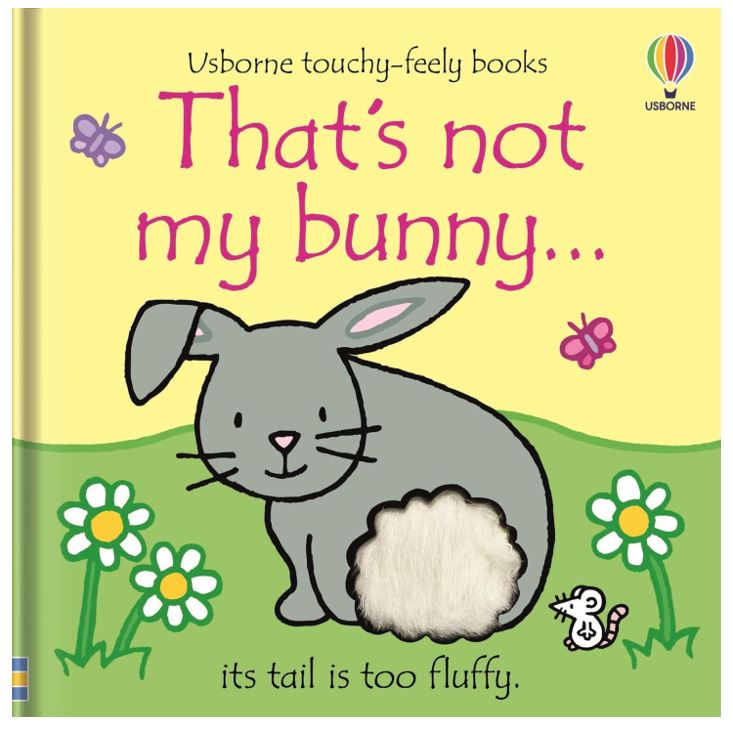
The 'That’s Not My' Books are a firm favourite of ours at GoodtoKnow as our Family Editor, Stephanie Lowe explains: 'Lots of different textures and bright colours kept my son engaged. There is also a mouse on every page to find which is great as the books grow with your child’s development. He's now five and still loves looking back over these.'
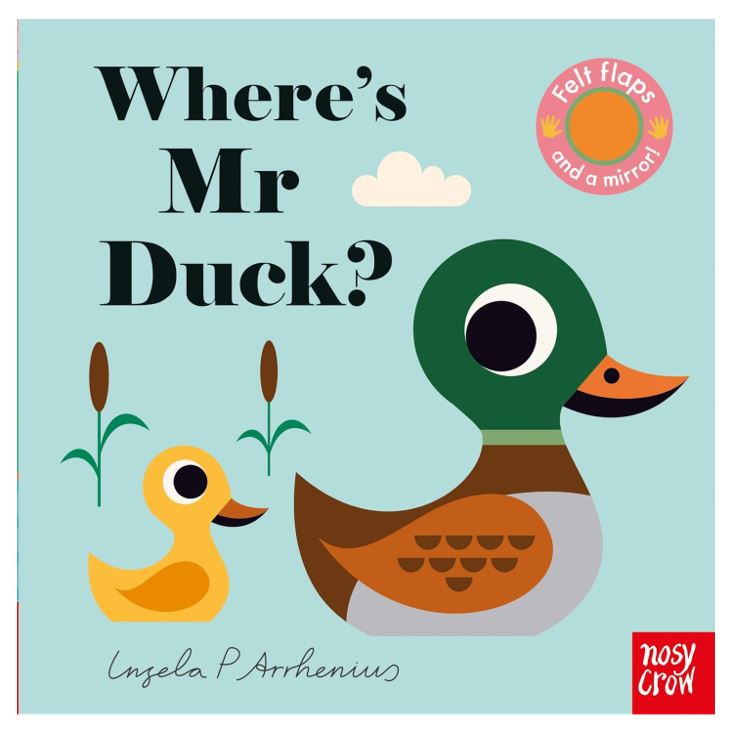
Bright and bold, with a felt flap on every page for little fingers to explore, there's a whole range of Where's Mr... books available. Mum of one Anna says: “I came across these in a cafe, and ordered some online straightaway! Freddie was instantly engaged - and loves the mirrors on the final pages. The illustrations are so modern and stylish.”
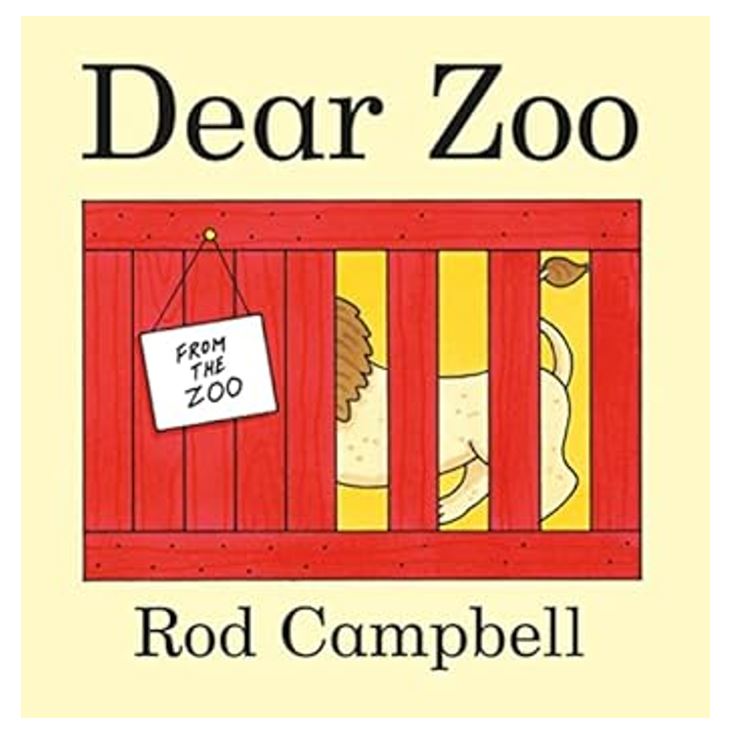
GoodtoKnow's Sarah Handley had this book as a child and bought it for her nephew too. 'This book was an absolute staple in my childhood, and I knew I wanted to get it for my nephew. He was nine months old when I gave it to him, and he loved trying to lift the flaps to see what animal was lurking behind.'
5. Jumper toys
When a child reaches six months they'll really enjoy using a jumper toy. Toys like this aid in developing your baby's gross motor skills, particularly leg and core strength, as they learn to bounce and balance. The sensory input from the lights and sounds, along with the tactile exploration of the toys, encourages cognitive development and sensory processing skills.
Fisher-Price’s Rainforest Jumperoo is a popular choice among parents for its engaging design, safety features, and developmental benefits. It offers a variety of sensory experiences and encourages physical development through play. GoodtoKnow's Editor Anna Bailey bought one of these for her daughter, Freddie, and never looked back, saying "Affectionately known in our house as the ‘circle of neglect’ - this was a life-saver when I needed a few minutes to make a cup of tea. Freddie grinned non-stop at all the lights and buzzers, and was so happy stretching and bouncing her little legs.”
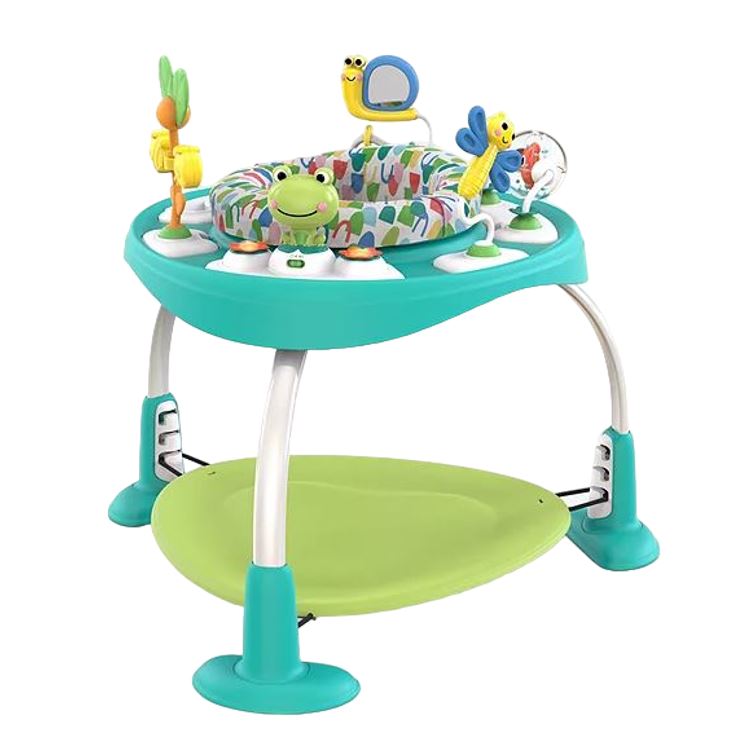
Having a toy that can adapt as your child grows is not only good for your bank balance, but it's a sustainable way to buy toys too. When in jumper mode, there are three different height options so you can ensure your baby's gross motor skills are getting the right kind of support. The activity table has a range of features including a musical frog with light-up lily pads, and spinner toys, and once your child can stand, it transforms into a standing play table. It's easy to wipe clean, and the seat cushion is machine washable.
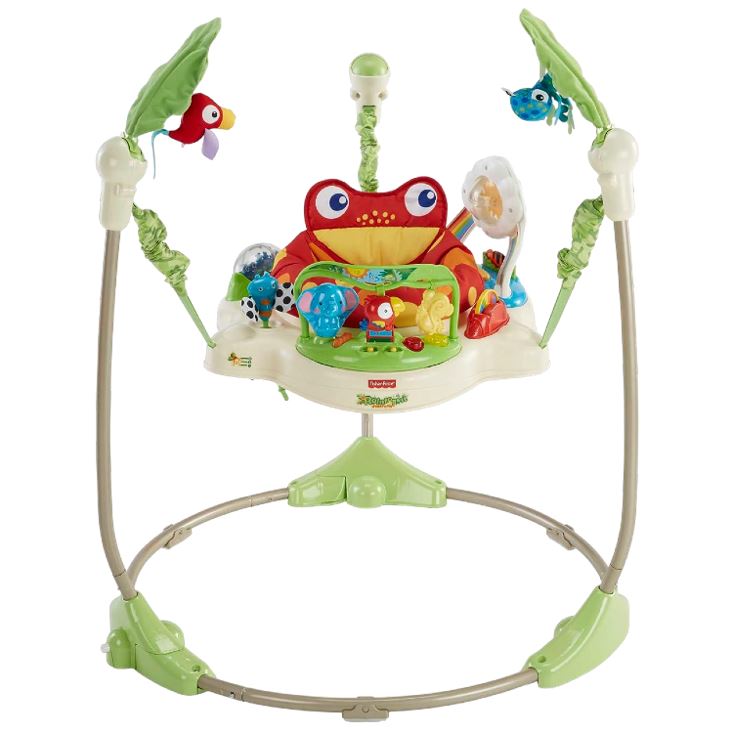
The Jumperoo comes in several different formats and there are versions that can be collapsed and packed away for easy storage - which is particularly useful for families that are short on space at home. But this rainforest is one of our favourites. Bright and colourful, with lots to keep your six-month old entertained, it’s a great way for your little one to start experiencing the world in an upright position. They can strengthen their leg muscles by having a good bounce too.
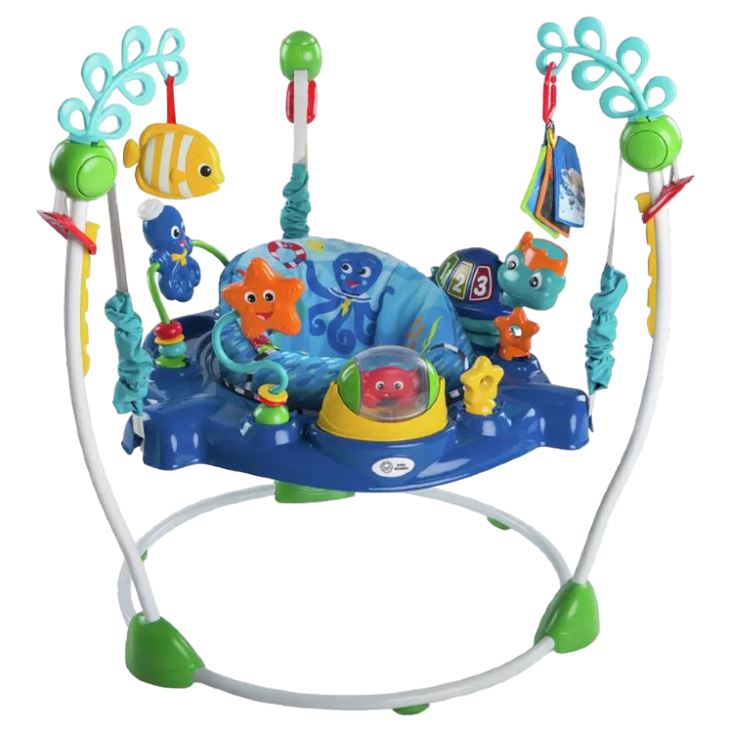
Brimming with ocean-themed activities just waiting your infant to discover, like the Jumperoo, this jumper toy will support their upper body while they work on their gross motor skills and strengthen their leg muscles by bouncing. It's a treat for the senses too thanks to lights, colourful toys and activities that spin.
6. Hide and Squeak Toys
These kinds of toys are ideal for child development at six months old because they enable children to discover hidden objects or characters, often accompanied by a squeaking sound - these are usually eggs that open to reveal colourful chicks or boxes with different doors and latches. They work to improve fine motor skills and hand-eye coordination as babies learn to open and close the different parts. This kind of toy encourages problem solving and cognitive development, and memory skills as little ones must identify and remember where objects are hidden.
Mum Liang bought a Hide & Squeak toy for her son and tells us: 'Probably one of my best investments in toys! My son has been playing with them since he was six months old, and he's still playing with them now at nearly 26 months in very different ways.'
GoodtoKnow's Editor, Anna Bailey agrees: "Freddie loves closing and opening the lids, putting all the eggs in and tipping them out - she also loves the squeaky noises. She’s 16 months old now and they still get plenty of play."
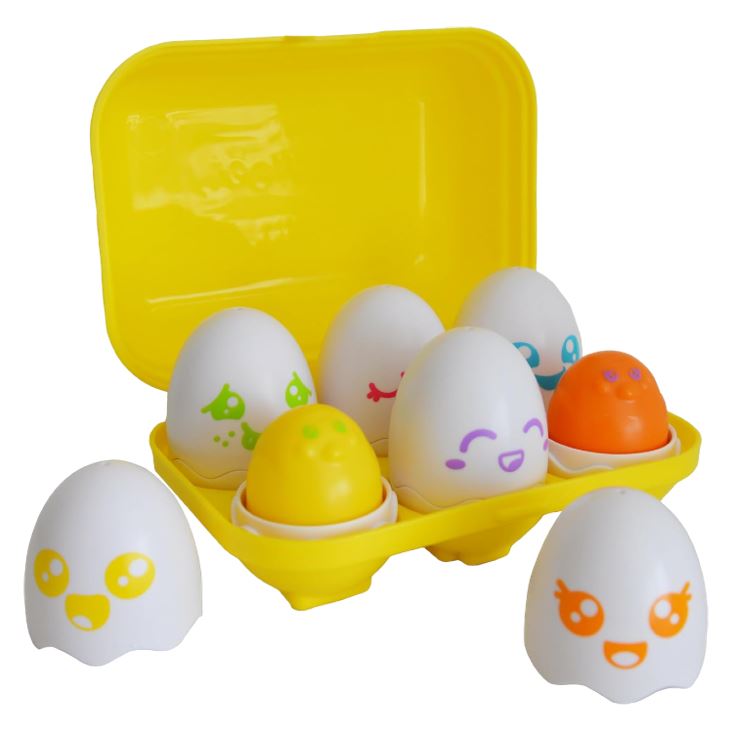
Shape sorting, colour recognition and a sensory symphony of sound are involved — all of which are great for keeping your baby amused. These chirpy little eggs can be cracked open to reveal a different colour inside and each has a different shaped bottom that fits into its own slot inside the carton. When your little one takes them out to play, they will hear them chirp as they push the eggs in and out of their shells.
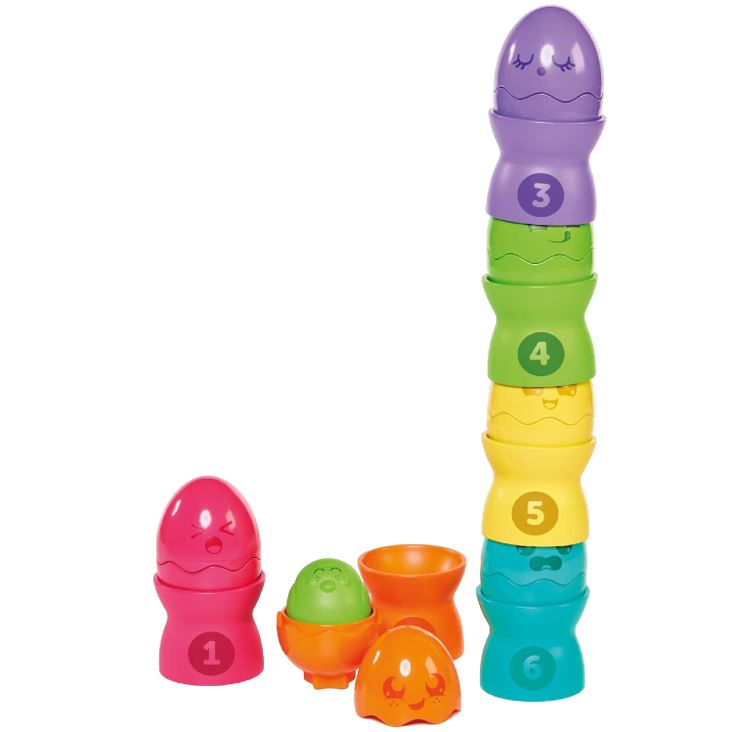
Combine the Hide & Squeak toys with a stacking motion for a really engaging toy for your six month old. The eggs and their stands can be stacked, helping your little one develop their fine motor skills and spatial awareness. With numbers on the cups, you can help with your baby's numeracy, while the bright colours help with matching and sorting skills. This set is also compatible with other Hide & Squeak toys to make the most of any collection.
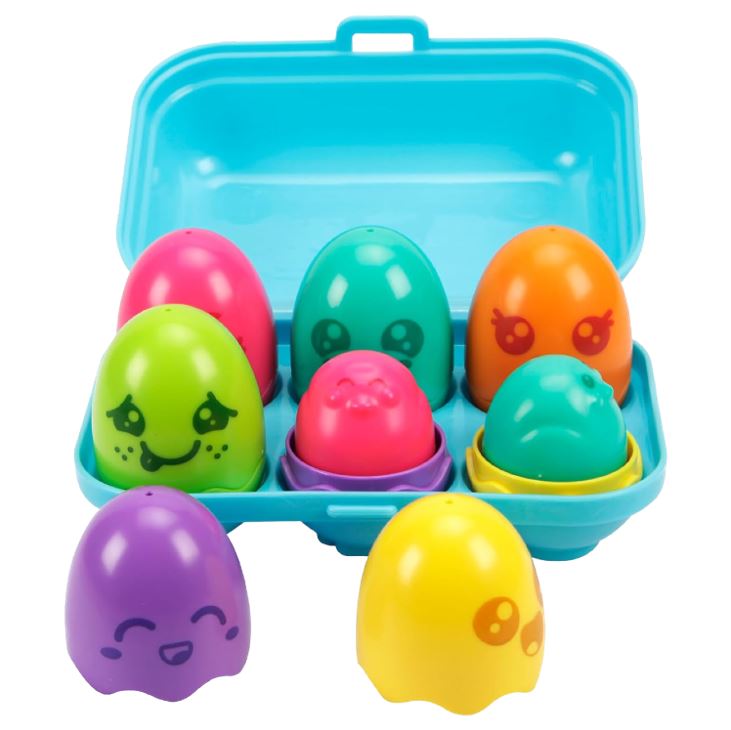
For a more colourful take on the original Hide & Squeak toy, try this Bright Chicks edition. Not only does this toy help promote colour matching skills, when your little on has to match the shell top to the bottom, it also helps to teach cause and effect. Three of the eggs rattle when shaken, while the other three chirp if pressed. The fact that they come in an easily secured egg box makes this a great toy for on the go.
7: Pull String Activity Toys
Ideal for babies when they turn six months old, a pull-string activity toy offers multiple ways of playing, from pulling strings up and down, pushing poppers from a convex to a concave position and back again, as well as lots of buttons to push and different textures to explore. These not only help your baby experience cause and effect but are also very effective at cultivating their fine motor skills.
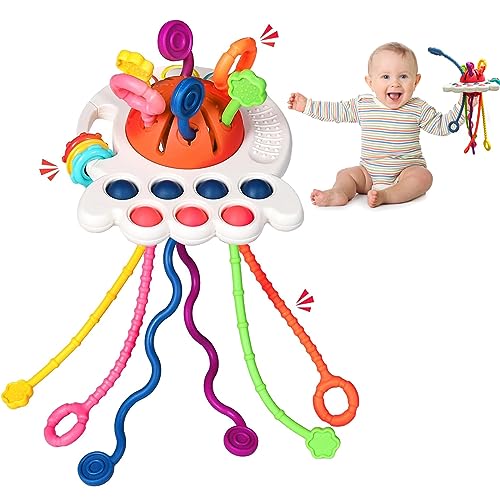
This activity toy will engage all of your baby's senses and help them hone their fine motor skills at the same time. Mum Anna told us how her daughter loved string toys like this when she was six months old: “Freddie loves teething and pulling the strings and pushing all the buttons. It’s attached to the buggy and has kept her occupied during some pretty long journeys.”
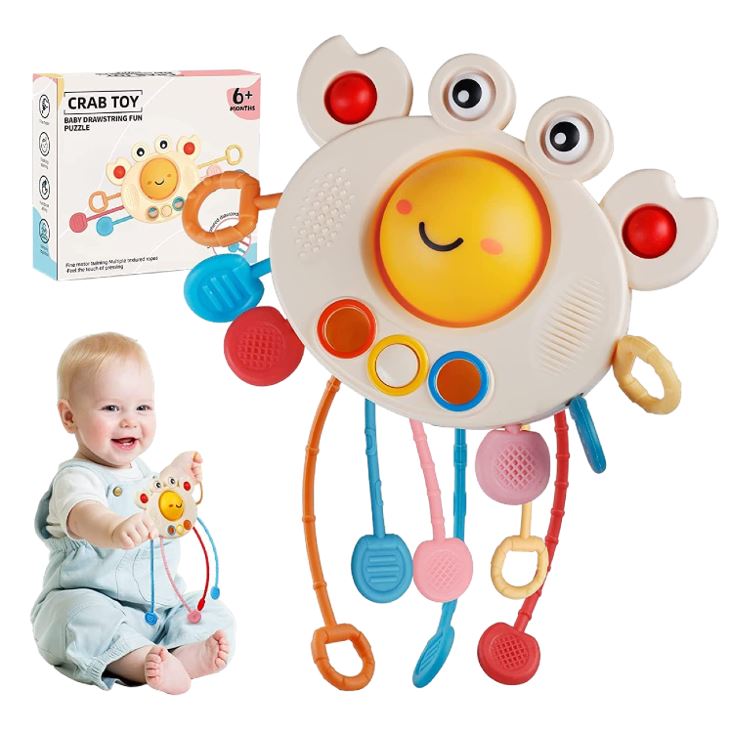
With an adorable expression, this crab toy is made from food-grade silicone and ABS plastic, and is free from BPA and phthalate, meaning it's safe for little ones to chew when they are teething (or just want to discover it by putting it in their mouth). Your baby will feel different kinds of vibrations when pulling on the strings for a really tactile sensory experience.
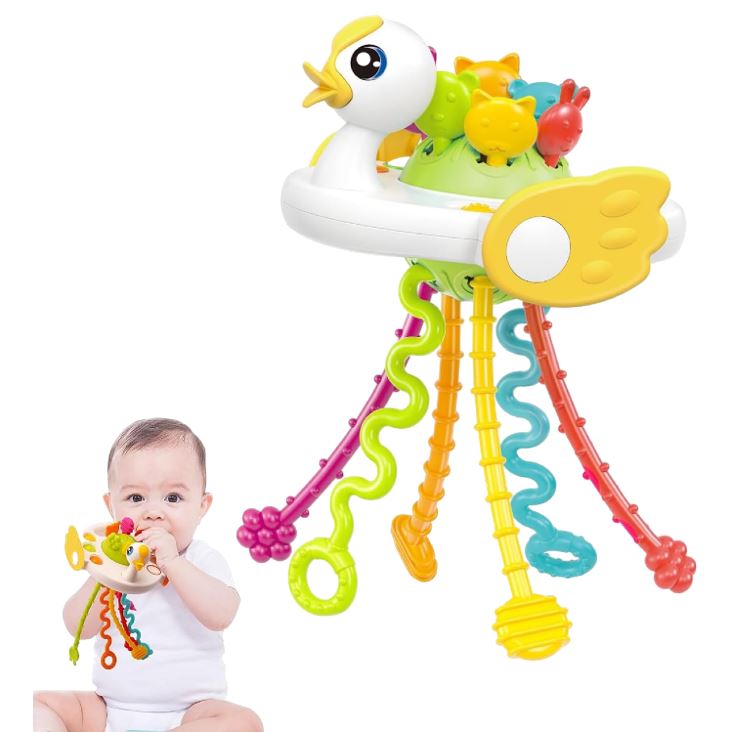
With its recognisable duck shape, this pull string toy can be pushed, pulled and shaken, offering a varied sensory experience for little fingers. As this toy is safe for chewing, it's important that it can be cleaned effectively. This one is easy to clean and can be put in boiling water, so you know you can keep it safe for your baby to play with.
8. Ball Pits
Bringing this soft play staple into your home is a great way to enable your baby to engage in some sensory play from the comfort of your own home (or garden). Beyond sensory fun, ball pits are fantastic for six months olds' gross motor skill development and spatial awareness as they encourage your little one to sit, stand, roll and crawl, which strengthens their muscles and helps them hone their co-ordination skills.
Having your own ball pit at home is also a great alternative to soft play, which can be very crowded and difficult for a baby to explore.
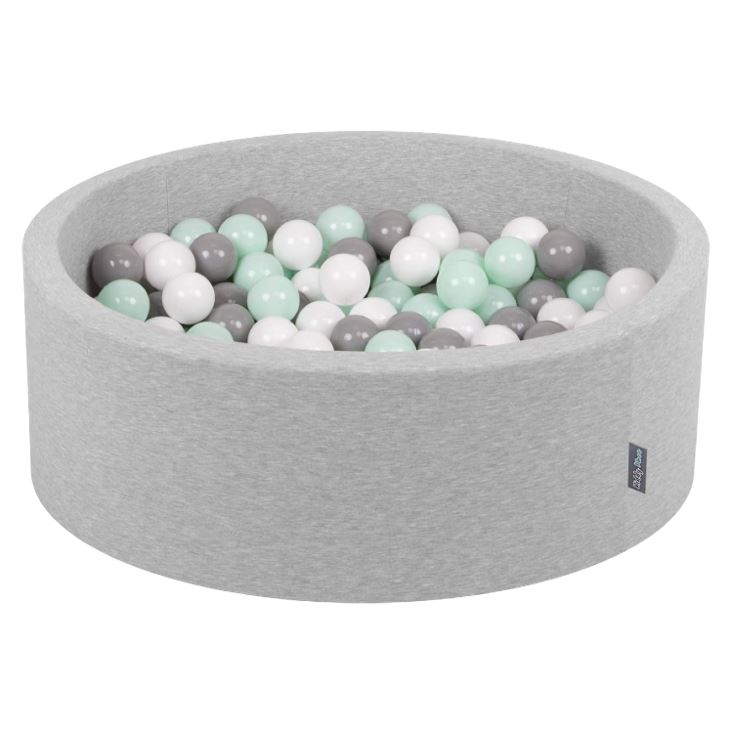
This 90x30cm foam ball pit offers great sensory play for your little one. It comes with 200 balls which, after being pressed, quickly return to their original shape so you don't have to worry about little hands being a bit too vigorous with them. If your home's aesthetic is important to you, then you'll love the fact that you can choose from a range of ball colours to suit your decor, rather than having to bear any garish colours that really don't float your boat. Your baby will have loads of fun regardless.
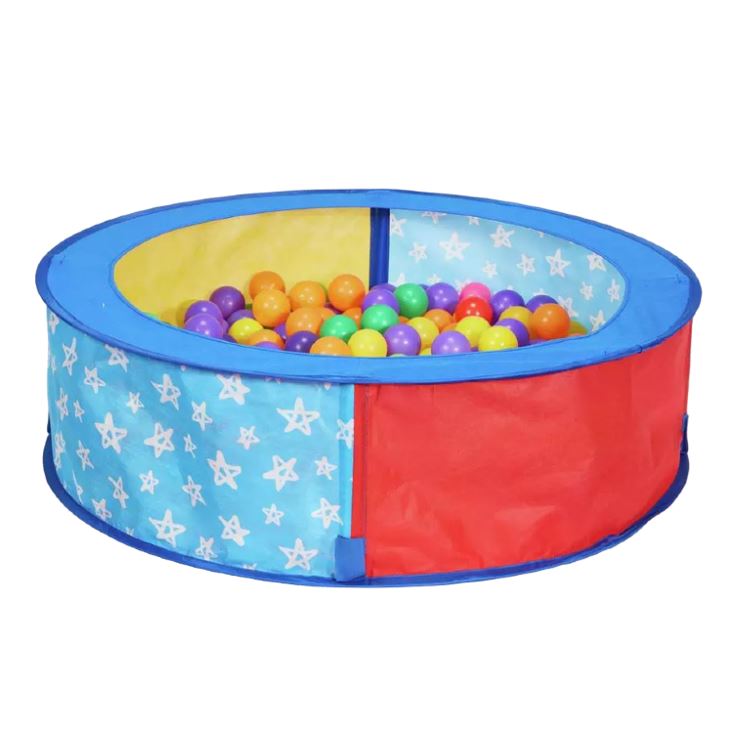
This brightly-coloured ball pit is a huge draw for your little one who will love the colours, textures and feel of this toy. We love this affordable version as it’s a pop-up that can easily be packed away and is transportable.Mum-of-one Dionne tells us, 'I bought the ball pit for Christmas and my twins love it. The sides were flexible enough to keep them in when she was small, and for them to get in and out by themselves when they were older.'
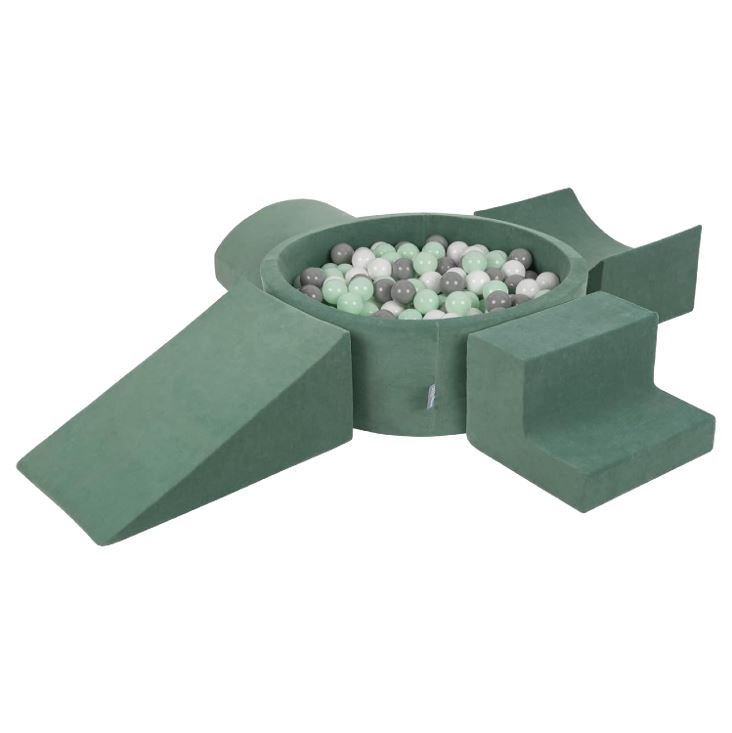
For something a little extra, this ball pit comes with extra velvet-clad obstacles for your little one to tackle. Their problem solving skills will get a work out as they try to navigate their way around the soft playground, while the ball pit will help them work on their grabbing motions as well as their ability to distinguish different colours. This also comes in a range of colours to suit any taste and the pool cover can be machine washed at 30 degrees so it's easy to keep clean.
9. Bath toys
When your baby is between six and 12 months old, bath toys really come into their own. Your little one will love indulging in some sensory play as they squeeze, pour, stack and splash their way through their bathtime toys. This kind of play also gives your baby the perfect opportunity to work on their hand-eye coordination.
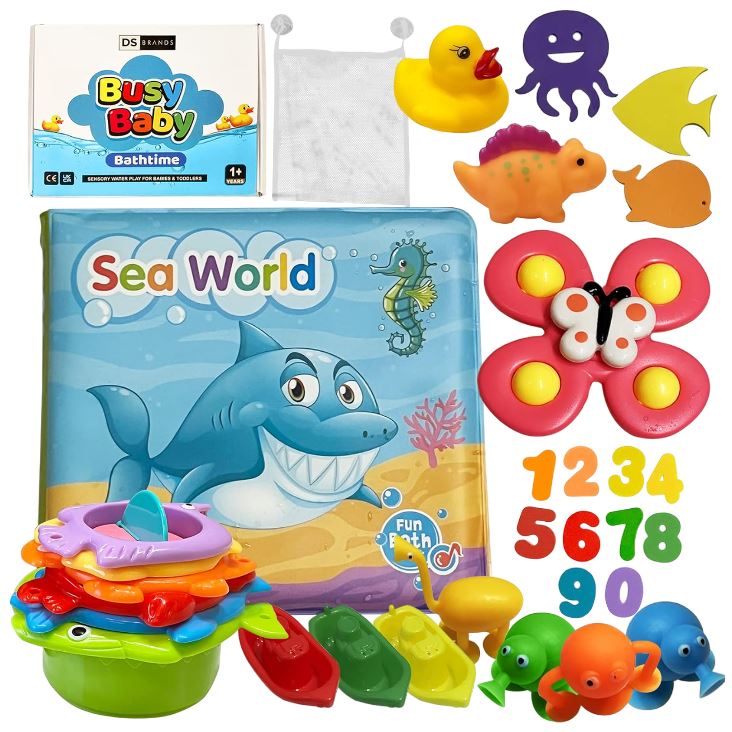
If you're looking for value for money, then this 26-piece bath toy set will be right up your street. The set includes an array of toys including plastic boats, foam numbers, a bath book, squeezy duck, suction cups and more. As well as building their fine motor skills, the toys can also help your child differentiate between size, shape and colour, which is a key part of their cognitive development.
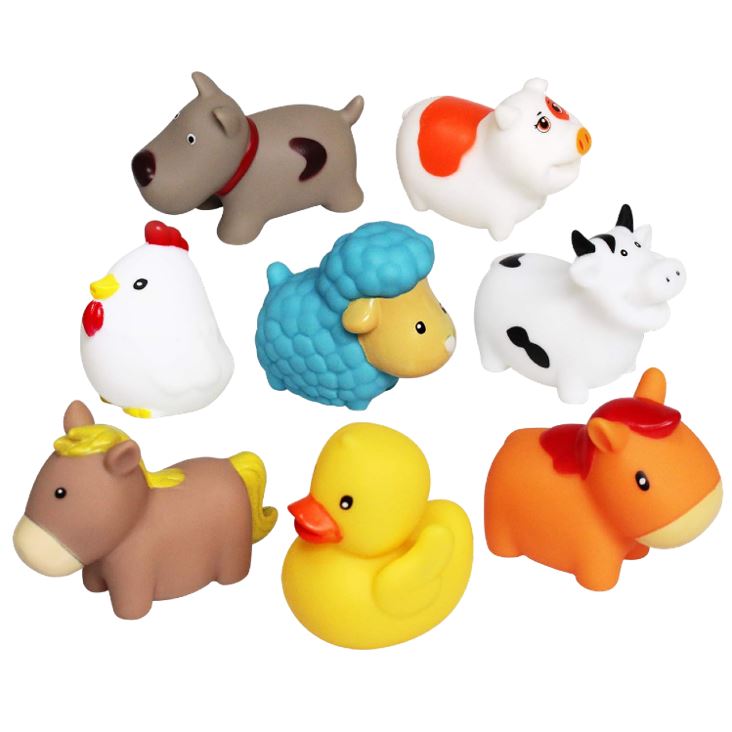
These durable and pliable floating bath toys are sure to be a hit with your six month old. The cute animals help to develop your little one's visual recognition, fine motor skills and get them using their imagination, while their little fingers enjoy discovering all the different shapes. The toys come in various other designs too, including dinosaurs, boats, vehicles and ocean animals if you want to mix it up a bit.
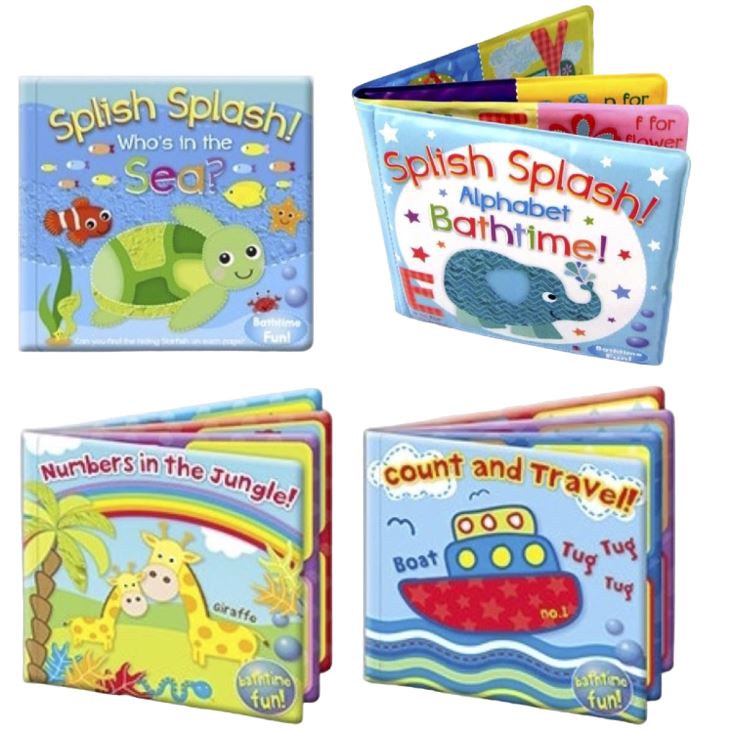
Padded, educational, fun - and they float. These bath books are perfect for six month olds to enjoy at bath time. They help to promote cognitive development and early literacy, while also helping little ones learn how to recognise numbers and letters. With bright illustrations, they books are really engaging, and little fingers will love squishing the padding and pushing the books into the water.
10. Suction cup spinners
For babies between six and 12 months old, suction cup spinner toys are great for their development. They encourage a range of movements, from grip to rotation, to enhance and exercise your little one's fine motor skills, while the engrossing game also helps them to learn and improve their hand-eye coordination.
Better still, these kinds of toys are perfect for keeping little ones amused while travelling, and the suction cup can stick to most flat and non-porous surfaces, like plastic, glass or tile.
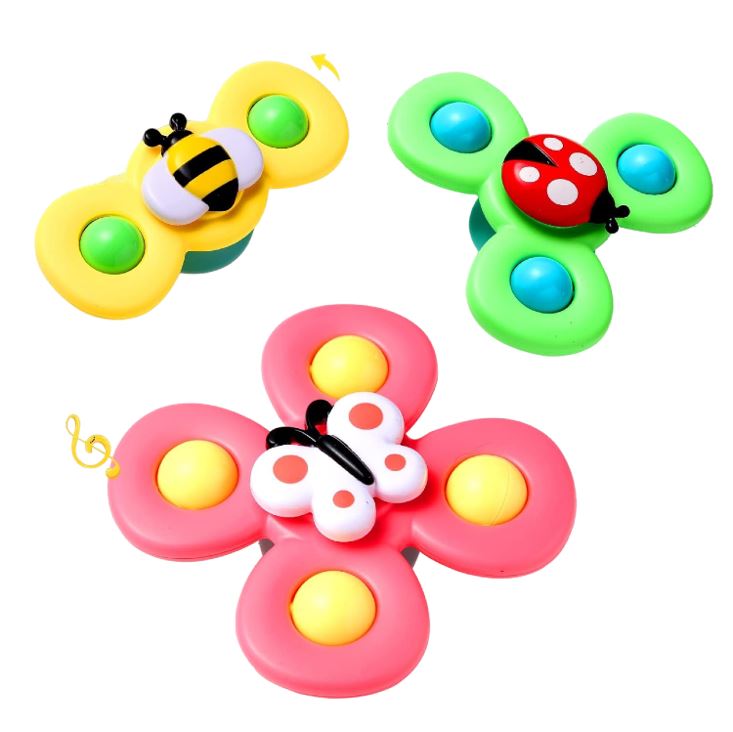
Keep your little one entertained and stimulate their senses with this three pack of spinner toys. Each toy is brightly coloured, and features a cute animal to help with your child's cognitive and emotional development. Their fine motor skills will get a good work out as they grip and spin the toy, while also working on their hand-eye coordination.
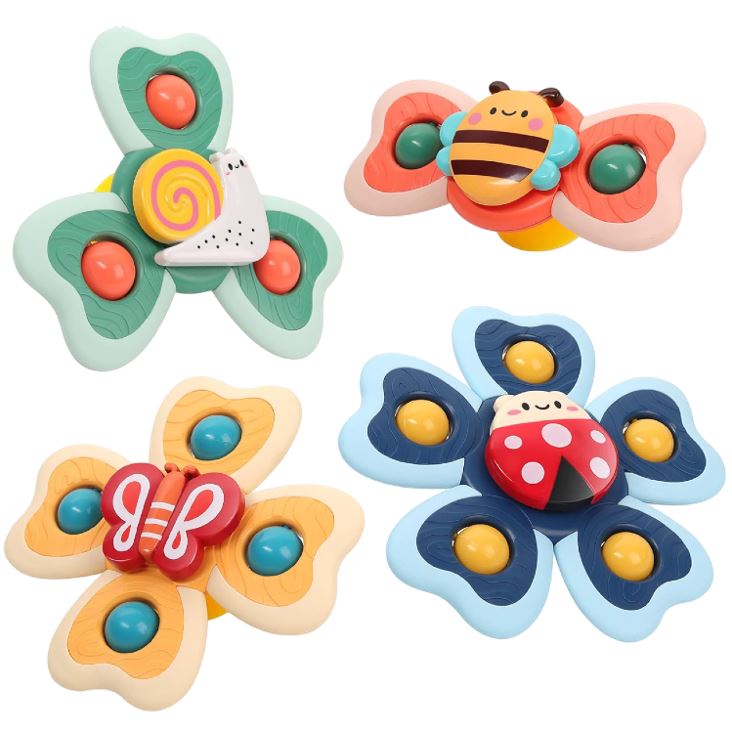
This four pack of brightly-coloured spinning toys feature fun insect characters, including a bee, snail, butterfly and ladybird. Not only is their lots for your little one to touch and spin, to boost their fine motor skills, but each toy also rattles when shaken, adding to the sensory experience.
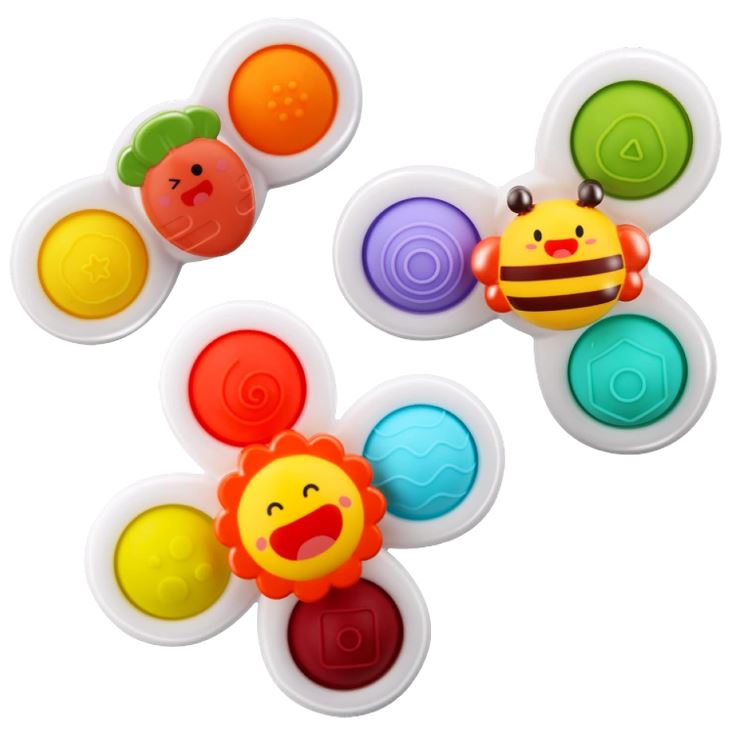
These spinner toys have textured silicone bubbles, cute characters and a built in rattle to keep your baby entertained. GoodtoKnow's Anna Bailey says: "We have these stuck on the fridge - they are really engaging and helped when we were encouraging Freddie to stand. We just placed them a bit out of reach and she was desperate to stretch her legs and spin them around."
11. Baby walkers
As it's common for your baby to take their first steps between nine and 12 months old (although babies reach this key development stage at different times, so don't panic if your little one needs a little longer before they get on their feet), a baby walker makes a great toy for babies at this age. As well as offering support while they grow their gross motor skills and build up the muscles in their legs, baby walkers also offer numerous activities to foster fine motor skills development too.
These are the best baby walkers according to our research and first-hand testing.
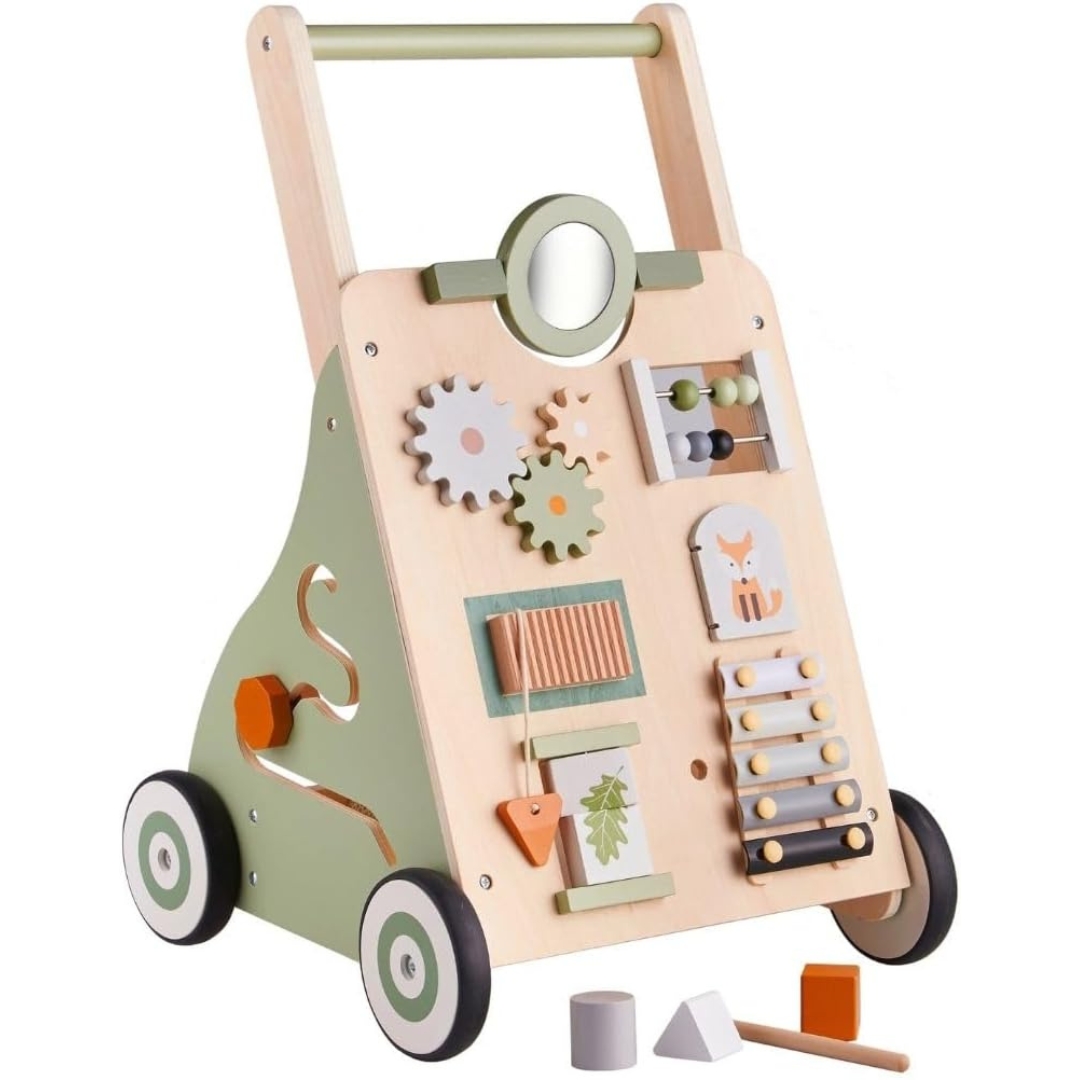
This baby walker tops our list as the best you can buy. Crafted from natural wood, it's a great alternative to the plastic options available. And there's loads to keep them entertained - a little xylophone, lots of things to spin, press and open, so your baby's fine motor skills will get put to good use.
Mum Charlie, who put this walker through it's paces with her son for our Haus Projekt Baby Walker review, says: "Until we had this walker to review, Seb wasn't really showing any interest in pulling himself up, but within a couple of days, he realised that he could hold on to the top bar of the walker, and from that moment he was off."
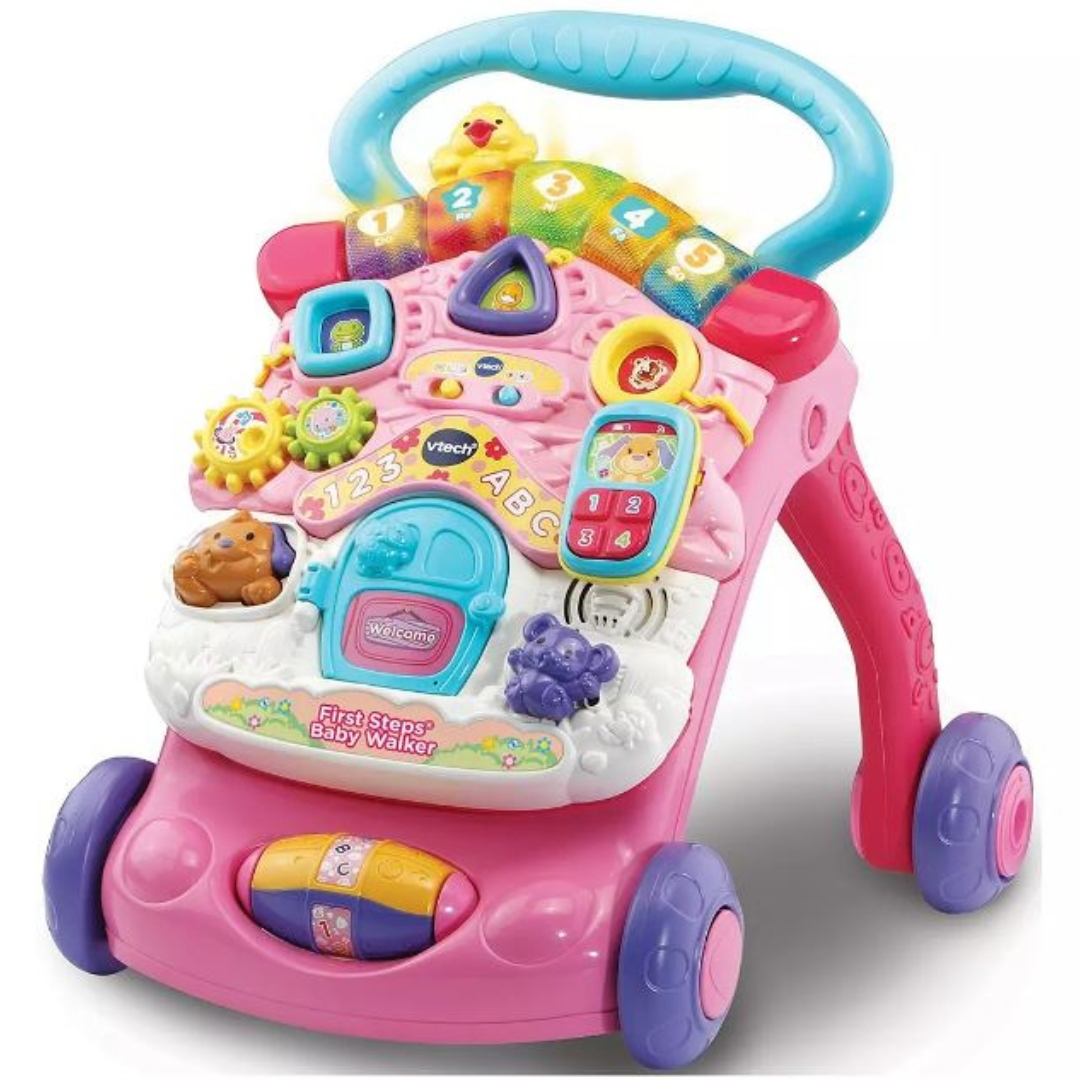
This is the best value baby walker on the market right now. Little fingers will take great delight in pressing buttons, turning cogs, and flicking switches as the walker lights up and plays tunes or animal noises. Toys like this are great for your baby's dexterity and developing fine motor skills between nine and 12 months, especially.
Dad-of-two, Pete tells us: “This is a great toy for babies learning to stand and walk. It is sturdy, stable, and doesn't roll out from under our baby too easily. When they want to sit down and rest, there are plenty of buttons and things to play with on the front. It also folds flat so we take it with us when we stay over with family.”
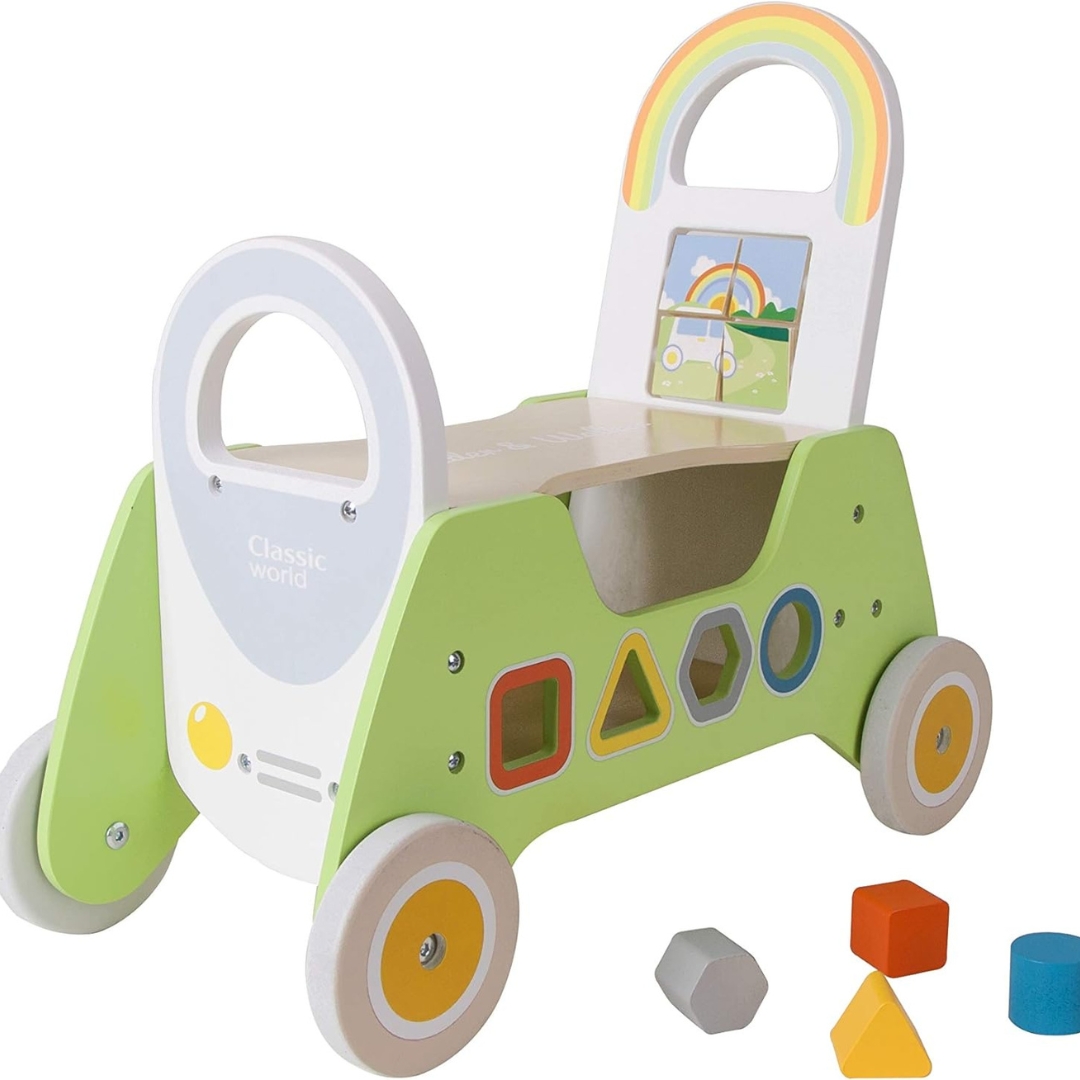
When it comes to ride-on walkers, we highly rate this Hippy Chick one. It's robust and made from wood, so perfect if you hate plastic and want something that is going to keep your little one sturdy. With spinning picture blocks, a built in shape sorter, and space to hide things underneath, there's plenty to keep your baby entertained and develop their fine motor skills.
Our parent tester Pippa says: 'This is by far the most robust walker I’ve seen and it's great for a little one starting to toddle... this seems less likely to roll away, leaving her flat on her face.'
12. Shape sorters
Shape sorters toys are popular choices, but the classic ones with shaped holes can often be beyond the capabilities of an infant between six and 12 months old. But shapes sorters with string are much easier toys for children of this age to get to grips with and are a great way to give their fine motor skills a boost.
This is also a great type of toy to promote problem solving skills as your little one has to figure out how to get the shapes in, and how to get them out again.
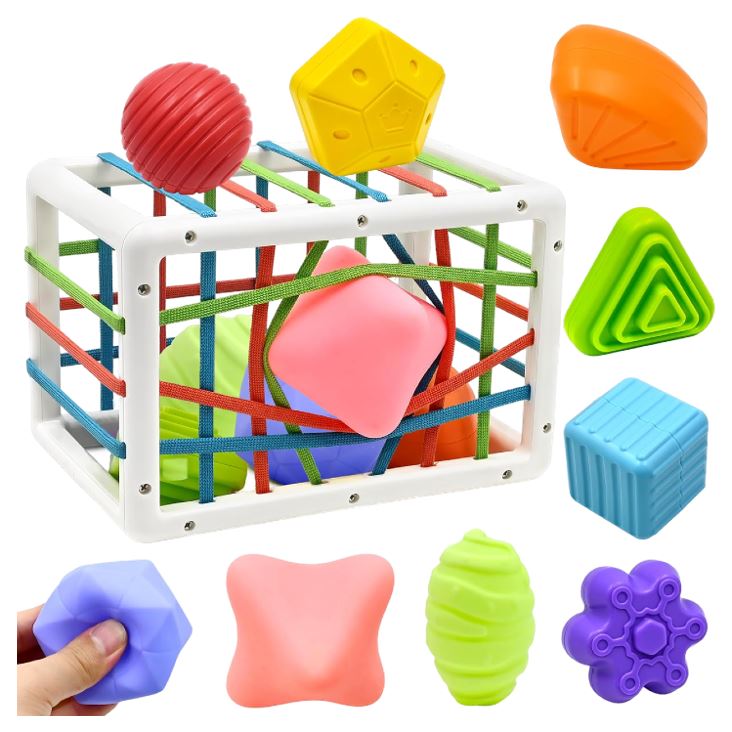
This shape sorter cube is perfect for six month olds as they develop their fine motor skills, with six textured shapes included, little fingers will love trying to push them through the elastic bands to get them in the box. Two sides of the cube have single rows of bands, which are aimed at six months olds, then, as they develop, they can move on to the sides with multiple rows.
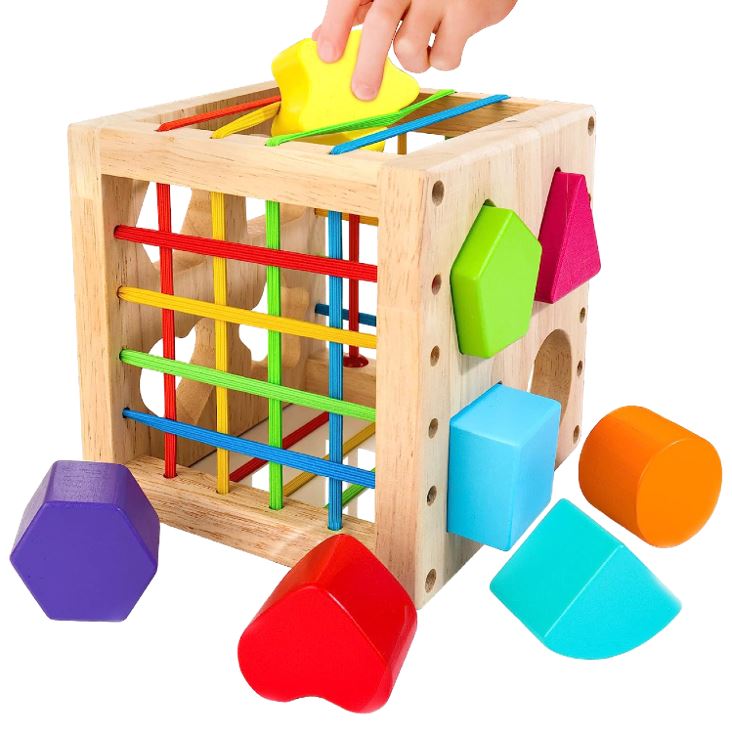
This wooden alternative offers the best of both worlds - both a string sorter and a traditional shape sorter, so it will keep your child engage even as their skillset grows. This kind of toy helps your little one grow their hand-eye coordination and dexterity, while also honing their spatial reasoning and shape recognition. It's easy to store all the shapes inside the cube when not in use too.
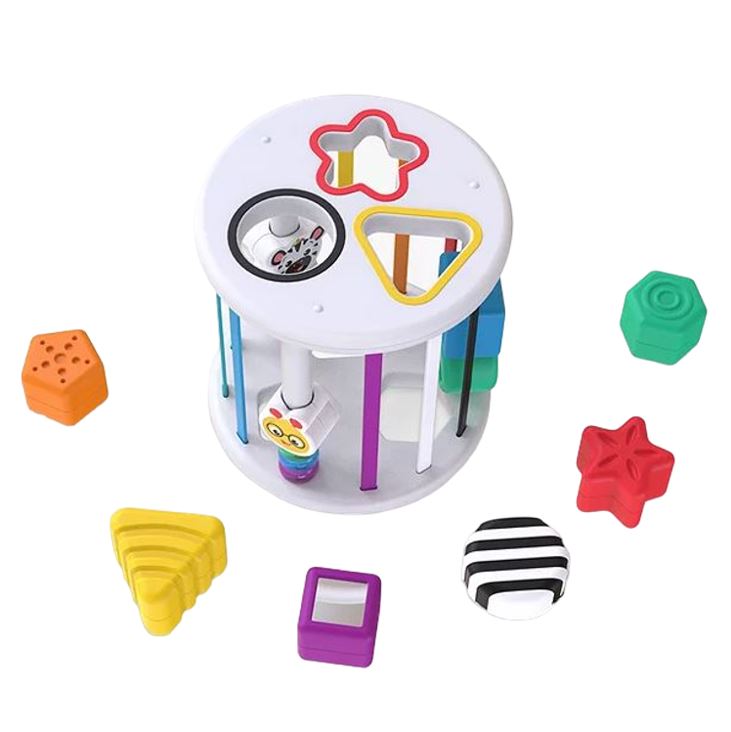
More than just a shape sorter, this one features multiple spinning elements, including zebra and caterpillar characters, and mirrors too. This one too offers a string sorter as well as classic shaped holes, and the blocks are both textured and brightly coloured, engaging your little one's senses. A great option to build your child's confidence as they engage in solo play.
13. Spinning tops
From six months, babies love playing with spinning tops. This type of toy not only helps with the development of hand-eye coordination, but also boots fine motor skills and demonstrates cause and effect, as little one's discover what happens when they push the top. Some options light up and play sounds adding to the sensory play, while others feature characters with friendly faces to aid your baby's emotional growth.
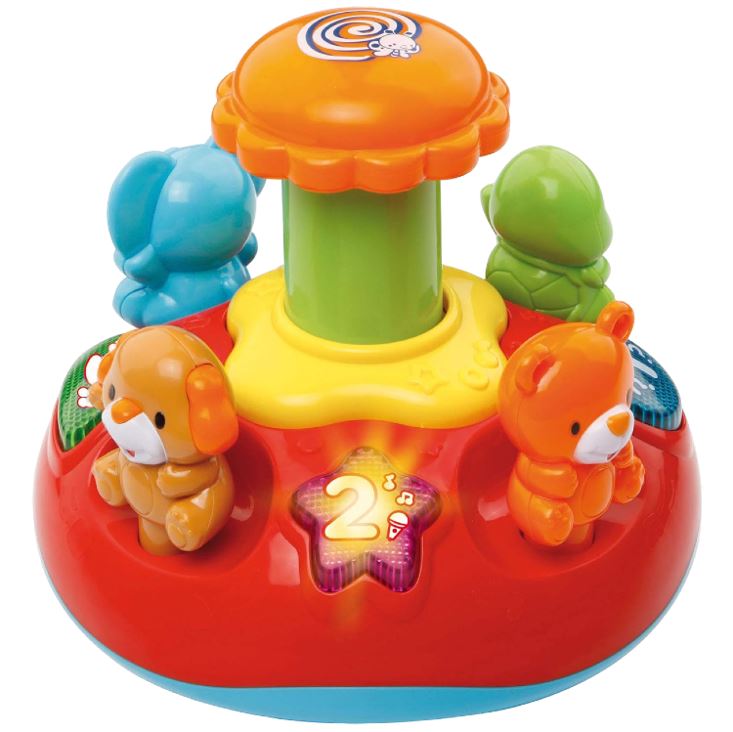
This spinning top is a great toy for six to 12 month olds as the chunky plunger means they can operate it while the hand-eye coordination progresses. There are fun buttons of different shapes to push, which triggers a mixture of songs, melodies and questions, as well as animal characters which help you child learn the names and colours of the animals.
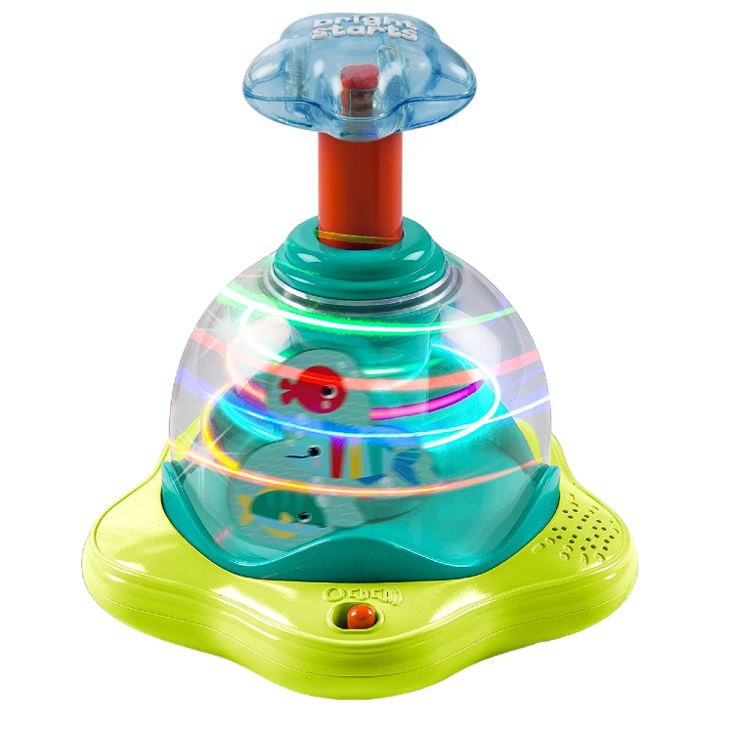
Little hands will love what happens when they press down on this spinner - they'll trigger lights, sounds and motion (giving them great experience of cause and effect). They'll grow their fine motor skills and hand-eye coordination as they grab and push down on the plunger to get the movement going.
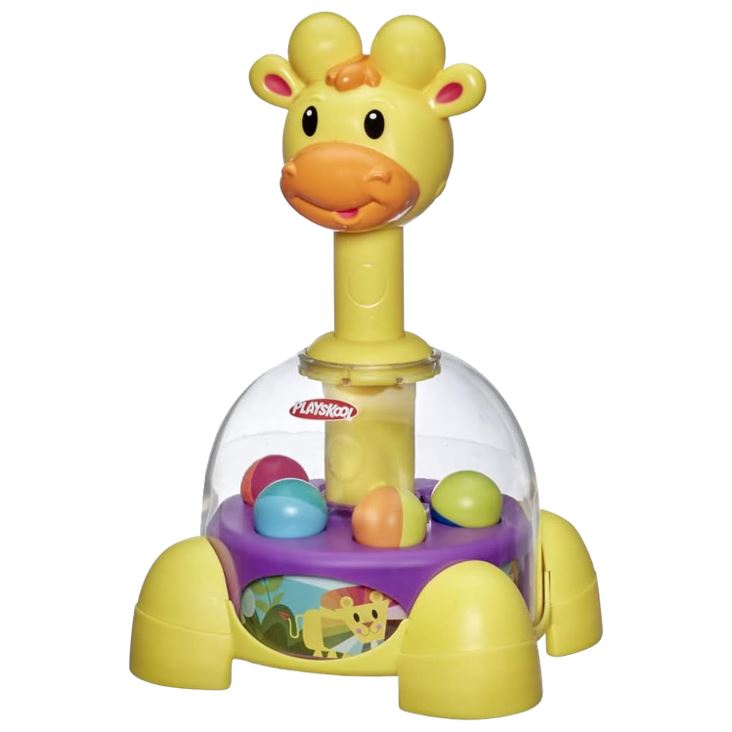
This adorable giraffe shaped spinning toy not only swirls the coloured balls around when the head is pushed, it pops them around too. With its bright colours and the friendly face on the giraffe, combined with popping sounds and spinning action, this is a great choice for sensory play and to help your little one practice their fine motor skills.
14. Money-saving toy sets
To enable your six-month-old to discover what toys they like, without breaking the bank, then a toy set is a wise investment. There are multiple options available (we've picked our favourites below), but they'll usually contain varied toy types that are perfect for six - 12 months olds, like stacking toys and spinners, with a variety of textures and shapes, all designed to stimulate your little one's senses, aid their knowledge of the world around them and allow them to practice their motor skills.
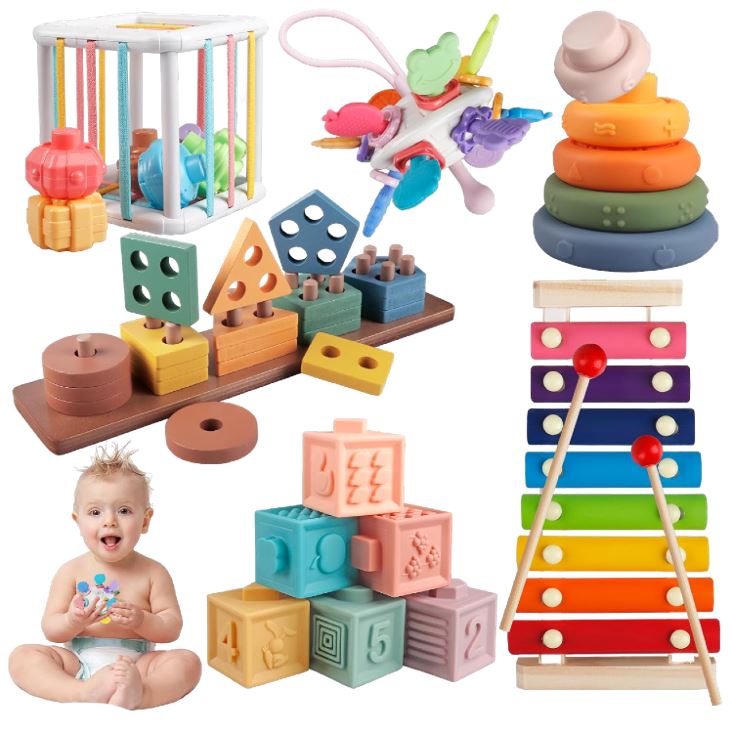
With six different toys in a single set, this is a brilliant option for parents whose baby is turning six months old. The set includes a wooden sorting base with 20 shapes to sort, stacking blocks, stacking rings, a xylophone and a shape sorting-cube, as well as a teething toy. All of these toys provide a well-rounded play experience for your infant - they'll practice their fine motor skills, explore the different textures and exercise logical and creative thinking.
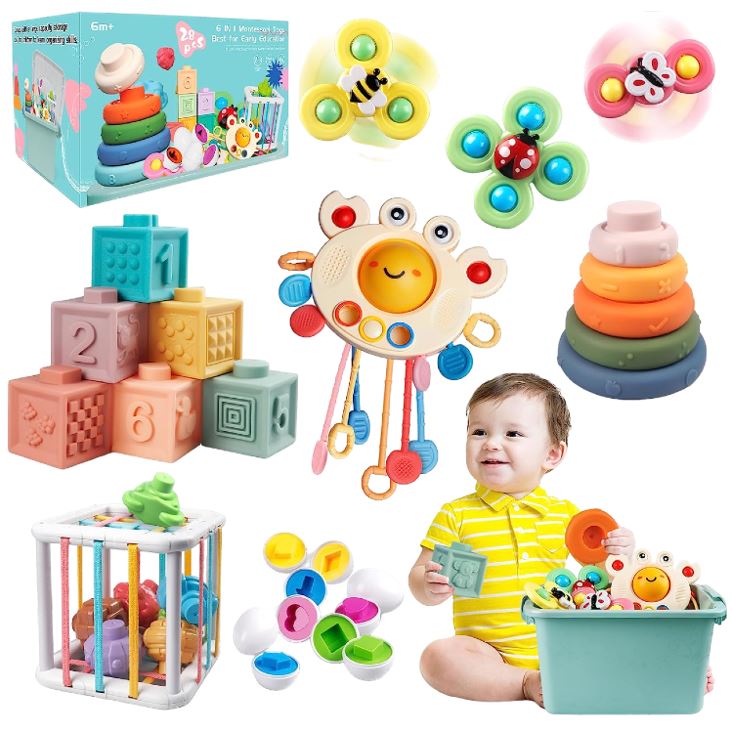
To buy similar toys in this set individually, it'll cost you £70 or more, so the fact that this six-toy set comes in at less than £40 makes it great value for money. The set includes soft building blocks, stacking rings, matching eggs, suction cup spinners, a crab pull string toy and a string shape sorter, and also comes with a storage bin to keep them all in. From sensory play to fine motor skills, they'll all get a work out with this excellent collection of toys.
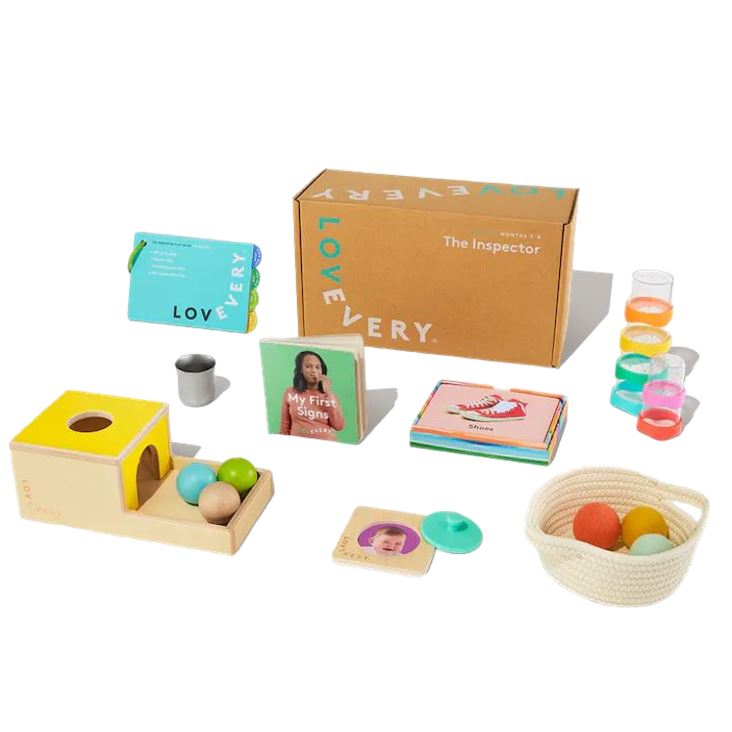
Lovevery's Play Kit subscription program delivers stage-based play products directly to your door every 2 to 3 months, depending on the child’s stage of development. A bit pricier than the other toy collections, these play boxes are full of interesting sensory toys - easily some of the best toys for six-month-olds, which your baby will love discovering. The Inspector Play Kit is suitable for babies ages seven to eight months, and features felt balls, texture cards, stacking cups, a ball drop box and more.
Which skills do babies aged 6-12 months develop through play?
When your baby turns six months old, you'll soon start to notice becoming a lot more engaged when playing. They're developing their sensory understanding by playing with toys that have different textures or that can be squeezed or produce sounds.
It's true, every baby develops at a different speed. For example, at six months some babies might be crawling, others might have mastered how to sit and some six-month-olds might just prefer to lie on their back. This is all perfectly normal, but it's important to invest in toys that match whatever development stage your little learner is at. At this age, babies will also be making more sense of the world around them and start to notice how their actions have an impact.
Studies show that engaging in free play is also key to your child's development and that this type of unstructured play teaches children to think creatively, problem-solve, develop reasoning and motor skills from an early age.
Rebecca Trueman, founder of Birth & Baby Hub explains: "Your baby is very busy at six months figuring out the world around them. They will be very keen to touch everything — even things you don’t want them to — and of course everything goes in the mouth! Simple toys that can help your baby start to understand cause and effect are good developmental toys at this age."
Rebecca says that this could be toys that rattle or shake or games that make a sound when you push a button. And it's for good reason. "Babies love to make noise at this age, and music has been proven to aid development in certain areas of the brain," she adds.
Additionally, toys like baby walkers, stacking toys, and ball pits can help develop both their gross motor skills, like rolling over, sitting up, standing and walking, and their fine motor skills like grabbing and using a pincer grasp between their thumb and forefinger.
Child development expert Dr Amanda Gummer agrees that fine and gross motor skills as well as sensory development are all achieved through play at this pivotal age. Speaking of sensory play, Dr Gummer explains: "Activities like supervised splashing in water, feeling different textures and fabric and exploring age-appropriate materials will all help promote and refine their sensory abilities."
But the act of playing itself goes beyond that. Dr Gummer adds: "Play provides a wonderful way of interacting and bonding with yourself or care-givers and will help develop social skills later in life too. Skills such as turn-taking, sharing and empathy can all be developed through play patterns and the expression of fun and emotion."
How to safely choose the best toys for 6-12 months
Nothing matters more than your baby's safety so toys for babies should be chosen carefully.
According to research into the factors influencing parent toy purchase decisions: 'Choosing a toy is not as simple as the majority of parents may think. A toy should be chosen initially with respect to many child considerations such as abilities, development, safety, age and gender.' The research also found that using-related factors; such as safety, durability and flexibility, were hugely important and were what parents prioritised when choosing and buying toys for their children.
Child development expert, Dr Amanda Gummer, says: "Always check for age-appropriate recommendations on toy packaging to ensure suitability for your child’s developmental stage. Finally, inspect toys regularly for signs of wear and tear, and take the time to discard any damaged or broken toys to prevent potential hazards. By prioritising safety, you can be sure your child’s toys will not only stimulate their development but also ensure their happiness and well-being."
Keep these things in mind when shopping for toys for children of any age:
- Check toy safety regulations - Check the item adheres to the relevant safety regulations for toys such as the CE mark. Many toys are not suitable for children under three years old so look out for these warnings and don't be tempted to buy something that isn't marked as safe for 0-3-year-olds.
- Make sure it's age appropriate - Always make sure toys are approved for use by a child of your little one’s age. Avoid anything with loose parts that your child could choke on and make sure any cords or strings are short and cannot become entangled around your baby.
- Easy to clean - GoodtoKnow's Consumer Editor and parenting expert, Heidi Scrimgeour says: 'Babies of this age tend to pop absolutely everything in their mouths which means items can get mucky fast. Therefore, the best toys for one-year-olds are those that can be wiped clean, popped in the washing machine or even run through the dishwasher if it's safe to do so.'
- Buy from reputable retailers - If you want to ensure good quality, then it's important your buy from brands or retailers that you know and trust.
- Consider value for money - Heidi adds: 'It's tempting to try and save some cash by choosing cheap, affordable items when you're shopping. While we love a bargain, it's often the case that pricier items give better value over the long term. Think about the difference between buying a cheap plastic toy compared to a more expensive wooden alternative. The latter could be passed down to younger siblings several times over and even last for generations, saving you money in the long run.'
Dr Amanda Gummer, adds: "One of the important things to consider when choosing toys for this age range is their ability to promote exploration and discovery.
"Look for toys that introduce basic concepts such as cause and effect, as well as those that encourage problem-solving and experimentation. Stackable blocks, shape sorters, and interactive activity mats are all great options.
"It’s also essential to choose toys that promote emotional development. Soft dolls, stuffed animals, and other comforting toys can help your baby feel safe and secure as they navigate their new world."

How we chose the best toys for 6 to 12 month olds
To compile this list of the best toys for six to 12 month olds, we spoke to multiple child development and baby experts so make sure the toys on this curated list would be developmentally suitable. We also spoke to mums and dads, who we have quoted in this feature, to find out which toys they and their baby rate.
As well as making sure that all of the age recommendations of these toys were appropriate, we have also make sure to include wooden and eco-friendly options where we can, as we commit to sharing more sustainable products with you.
In addition, GoodtoKnow's Editor Anna Bailey bought and tested the most popular toys on this list with her daughter, Freddie, which was fed back into this article. Anna says: "As Freddie came up to six months old, she was taking a more active interest in the world around her - and it felt like she’d grown out of the sensory toys she liked before. I was really keen to aid her development with a range of new toys she’d be more engaged with to help her develop. To help compile this list, I spoke to all my NCT mums, paid attention to what the other babies were enjoying at the Toy Library and play sessions and scoured the best-seller lists at our top toy retailers. Freddie is 18 month old now, and she still plays with most of the items we reviewed on this list. Her absolute favourite have been the interactive books, the bath toys, the pull string toy and the stacking cups."
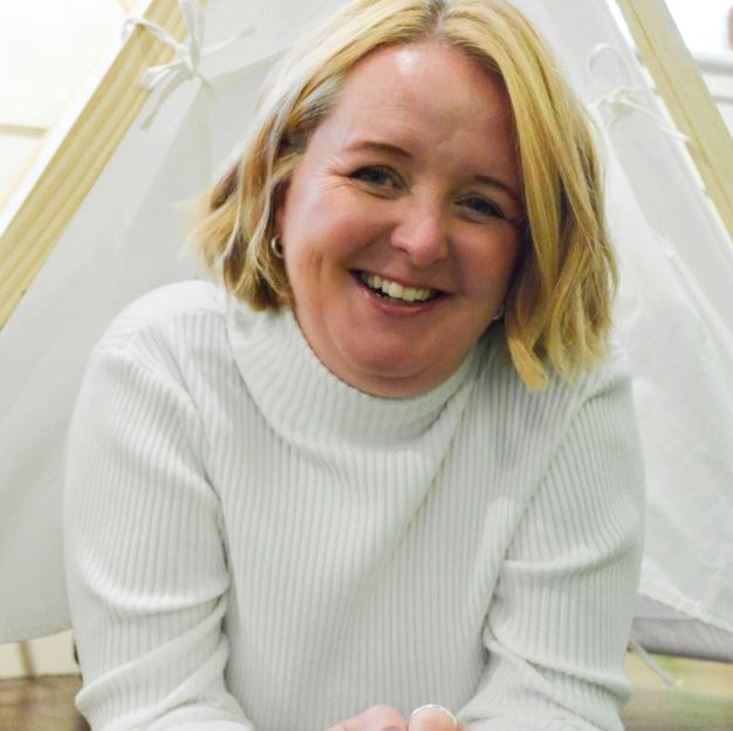
Dr Amanda Gummer has a PhD in Neuropsychology, the Postgraduate Certificate in Higher Education and more than 20 years’ experience working with children and families. As such, she is renowned as an expert on all aspects of child development, including toys and play. In 2012, she founded The Good Play Guide, an independent, expert accreditation service for children’s products, including toys, apps and more.
Continue reading
Parenting advice, hot topics, best buys and family finance tips delivered straight to your inbox.
Sarah is GoodtoKnow’s Money Editor. After Sarah graduated from University of Wales, Aberystwyth, with a degree in English and Creative Writing, she entered the world of publishing in 2007, working as a writer and digital editor on a range of titles including Real Homes, Homebuilding & Renovating, The Money Edit and more. When not writing or editing, Sarah can be found hanging out with her rockstar dog, getting opinionated about a movie or learning British Sign Language.
- Heidi ScrimgeourDeputy Editor
